Ten Tips
1. Read with them
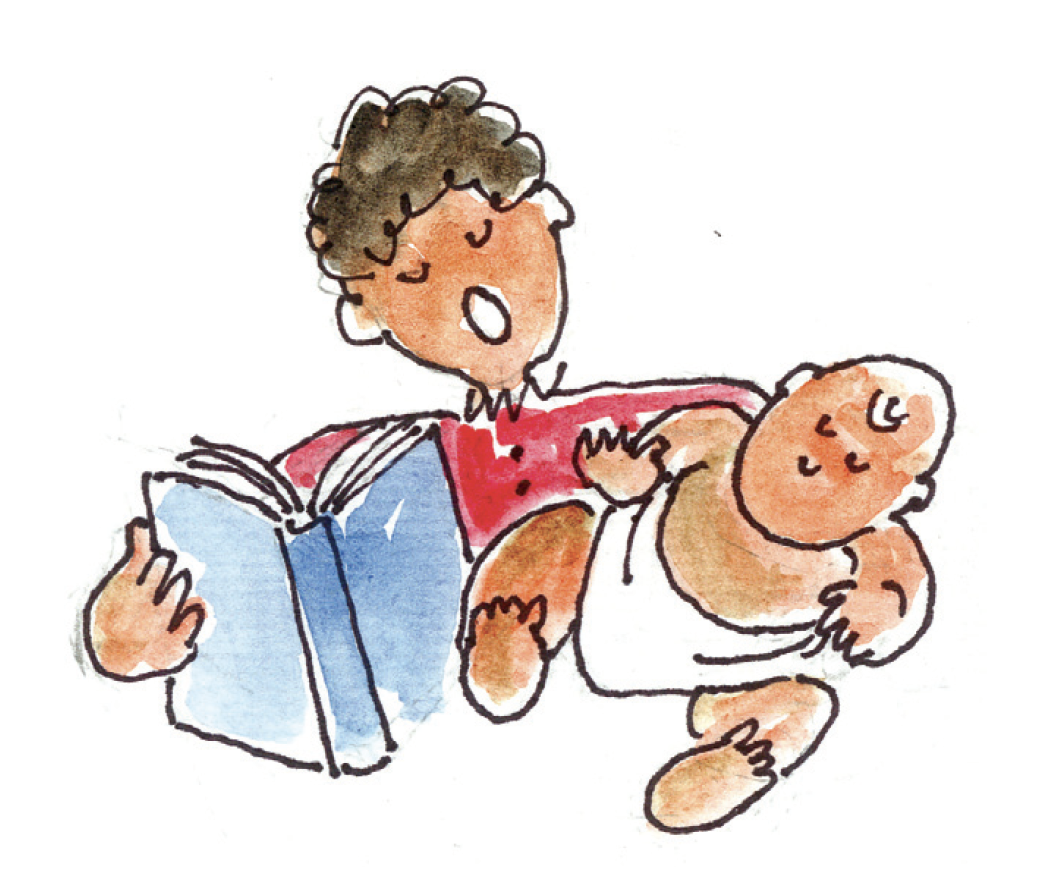
Cuddle up with them and a book at least 20 minutes each day.
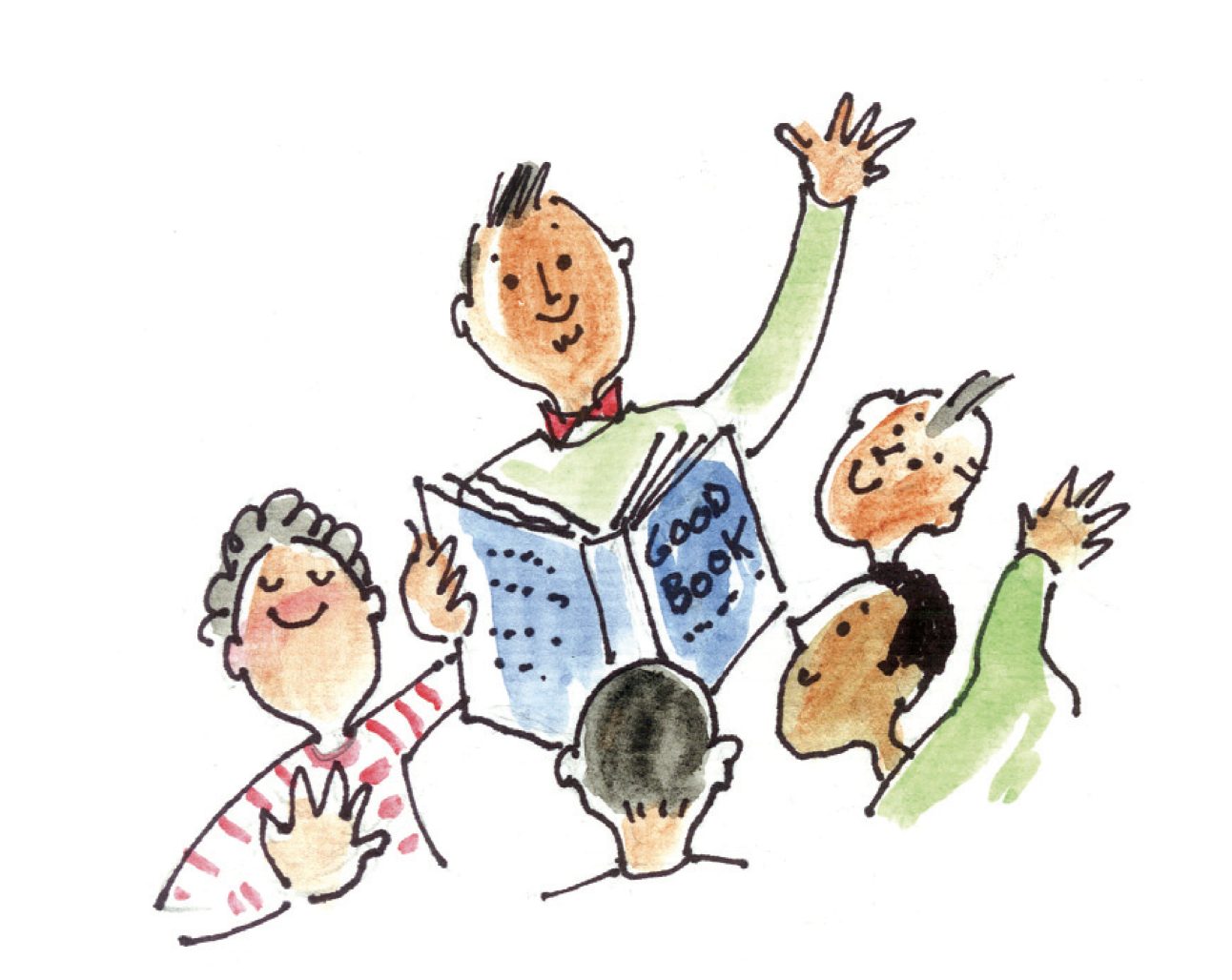
Read with expression in your voice and make it fun
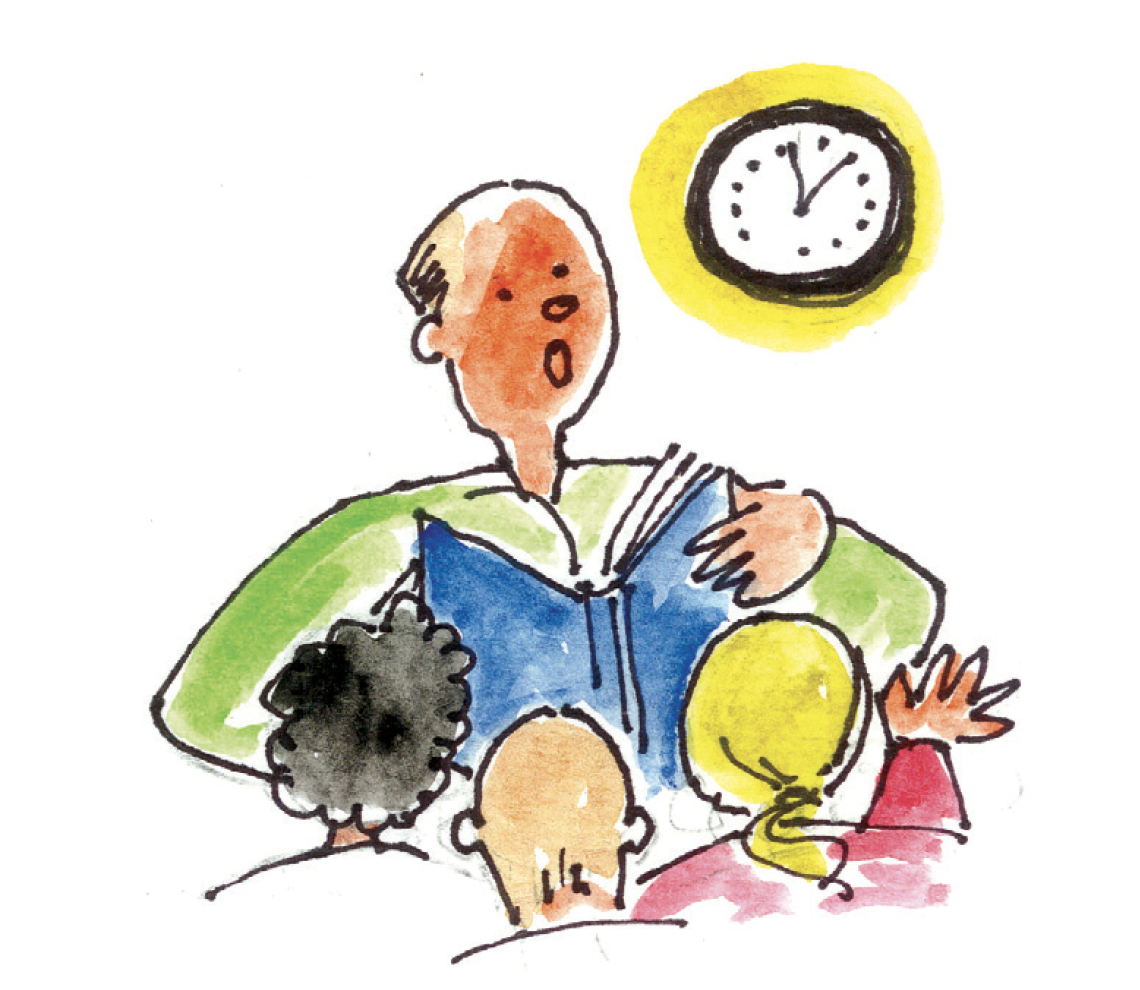
Ask questions, talk about the pictures, and let them point out things
Reading to your child every day, starting when he is an infant, will help him become a better reader, a better student and happy and successful adult. Just 20 minutes a day reading aloud with young children strengthens relationships, encourages listening and language skills, promotes attention and curiosity, and establishes a strong reading foundation. These skills are essential for success in school and in life. So, if you read to your child regularly and start early, they will most likely become a good reader, a better student, and learn to love reading all of their life. Reading time will become a peaceful and enjoyable time for both of you. Your own life will be easier because you will have a smarter, better-behaved child. PDF version
Whatever you do, try and make reading together the most important and happiest 20 minutes of your day.
- Start reading to your child when he or she is an infant.
- Read in a warm, comfortable place without TV on or any other distractions.
- Start with cloth or board books with brightly colored, simple pictures to start with. Even if a baby doesn’t understand the words, she feels the connection with you.
- Reread favorite stories. Don’t get frustrated if your kid wants the same book read over and over. We all have our favorite things.
- Read with expression and talk about what you are reading. Be animated. Change your voice and have fun with the story. If a mouse is speaking in the book, read that part in a high, squeaky voice. If it’s a bear speaking, use a deep, gruff voice.
- Point out the words as you read to your child and get them to read along if there are parts of the story they remember.
- Start to point things out on the page, like a ball or an animal or a bed or a chair. Use words that will help your child learn. Don’t just say “Look at that ball,” but say “Look at that red ball. Isn’t it pretty? Can you find the yellow ball?”
- When she grows older, visit the library and let them ask the librarian what books she might like or let her pick out her own
- Ask your child questions about the books. “What do you think will happen next? Do you see the red ball?
- Have books in your house --- bedrooms, bathrooms, living rooms, kitchens.
- Carry books with you when you go out, such as when you go for a doctor visit or take the bus.
- Point out words on street signs or signs at the park or on the bus.
- Make reading fun. If your child is too impatient, wait and do it later. Forcing a child to read sends the wrong message.
- You should even keep reading to your child after they have learned to read by themselves.
- Reading to them at least until they are in the third grade is a good idea.
- Reading is a skill that takes lots of practice with the help of another person.
- You almost can’t read to your child in a wrong way, but there are ways to do it better.
2. Talk and listen to them
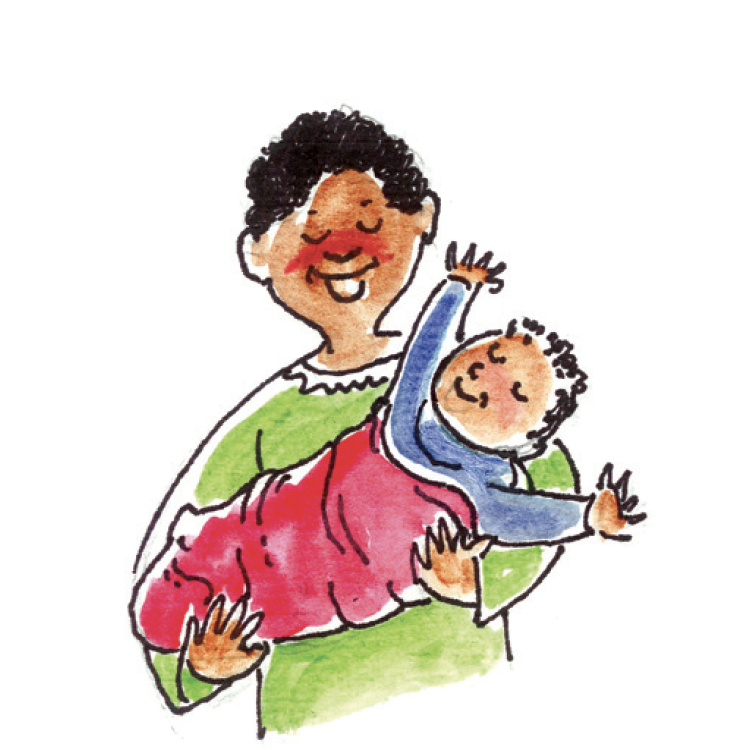
Start when they are tiny babies
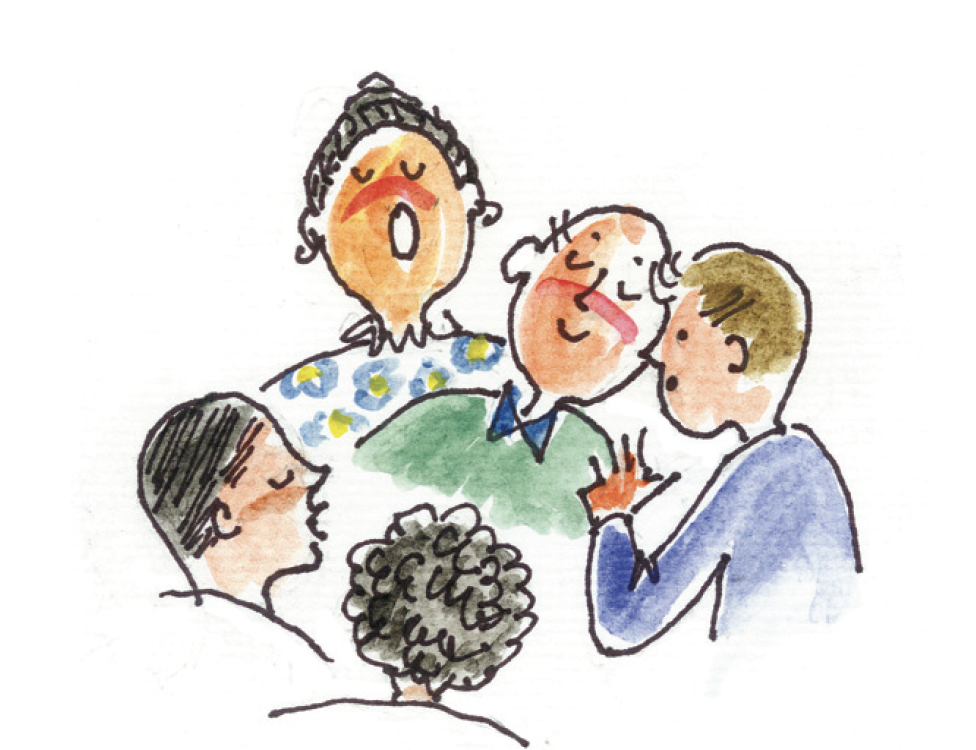
Tell family or made up stories
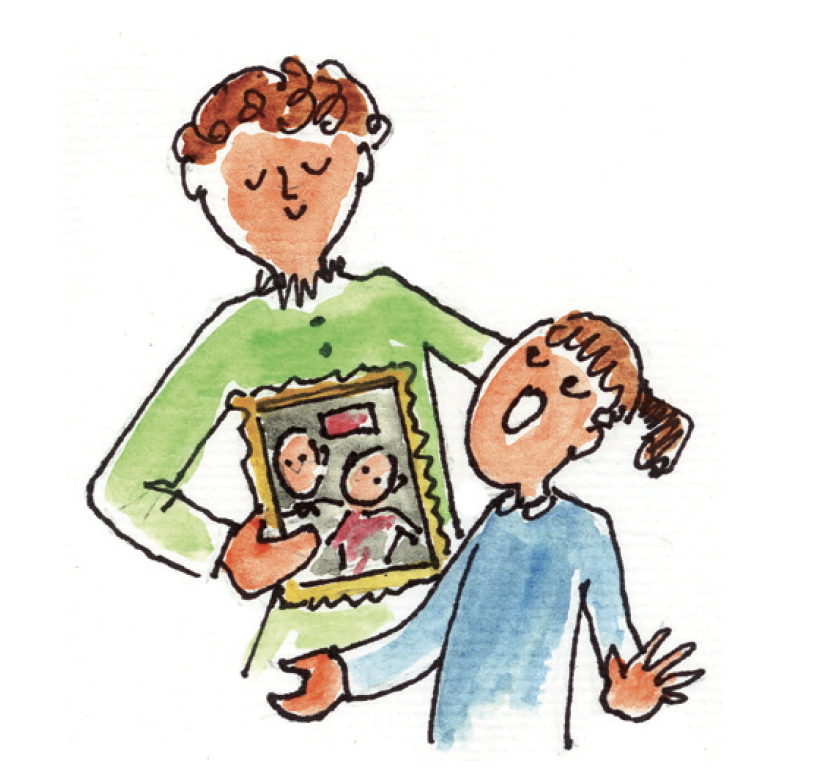
Ask them about their day
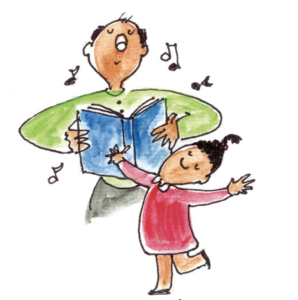
Sing nursery rhymes and silly songs

Talk any time you do things together
Experts say the first two years of life are critical for your son’s or daughter’s normal development of language, thinking and mental health. Talking and listing carefully to your kids helps them with this development. Basically, all you have to do is:
- Talk to your kids all during the day when both you can focus on them and when you are doing other things
- Listen carefully to what they say and try to answer them the best you can
Talking to your daughter to help her develop means more than just talking. It includes talking, listening, asking questions and paying attention to her.
When children are just babies, they naturally reach out to you through babbling, facial expressions, and gestures. Adults usually respond with the same kind of baby talking, singing and gesturing back at them. This helps your child’s brain to form so it can learn better later on.
You also help your son by singing songs and telling him stories and nursery rhymes. Playing “This Little Piggy Went to Market” with his toes is a great example of talking to him and touching him at the same time. He will usually laugh and giggle because he knows what’s coming and he loves it.
The National Association for the Education of Young Children says that “Babies delight in hearing language. Talk to them as you do simple everyday things together: recite nursery rhymes, and do finger plays, games and action songs.
First, it helps them learn about language and talking. Parents Action for Children says that “Babies build their literacy skills by hearing lots of words, so talk to your children, right from birth. Look in their eyes, listen to the coos and babbles, and engage them in “conversations. Sing them nursery rhymes and silly songs. Make up stories for them.”
Second, it helps him or her learn to think. When you ask a question, or make a funny noise, they try and figure out what you are doing. This helps their brain develop the electronic highways of circuits it needs to develop, which will help them in school later on.
This is important because, as Harvard Magazine says, “The children with the largest vocabularies in Kindergarten still had the largest vocabularies six years later.” So, they say, “Talk to your kids in grown-up language. Instead of saying “Eat your peas,” for example, you might say “You need to eat your peas because they have vitamins in them.” This is important because, as Harvard Magazine says, “The children with the largest vocabularies in Kindergarten still had the largest vocabularies six years later.” So, they say, “Talk to your kids in grown-up language. Instead of saying “Eat your peas,” for example, you might say “You need to eat your peas because they have vitamins in them.”
You can talk to your child about whatever is going on at the moment, or you can make up stories to tell them. Sometimes its good to talk about whatever is going on at the moment. For example:
- Talk to your son at home. It is good to point out new things to your child and tell her the names for them. Say “This is cheese I am putting into this pan. Do you know where cheese comes from? It comes from milk. And what animal makes milk? Yes, milk comes from cows. And what sound does a cow make? That’s right. Moooo.”
- Talk to your son on the bus of in the car. Show them buildings you are passing --- “There’s the post office. that’s where our mail comes from.” Or say “That’s a fire truck. It makes lots of noise so people can get out of its way. It is in a bug hurry to go put a fire out.”
- Talk to your son in the grocery store. Say “This is a quart of milk and this is a half gallon. We are going to get the half gallon because it is bigger and milk is good for us.”
- Talk to him when you are standing in line. “Look at how slow this line is. What can we do to have fun while we are standing here?” How many people do you see wearing red shirts?”
- Explain to him why he can’t do something, like play with knives or sharp scissors. “No, you can’t play with these. They are not for babies. They could cut you and hurt you.” (Then put the scissors away and give your child something else to play with that isn’t dangerous.)
A mother or father who listens carefully to their son shows him that he matters. It is hard if he is babbling all the time, but when you stop and give him your full attention, you are teaching him that at that moment absolutely nothing matters more than hearing what he has to say. It is one of the most precious gifts you can give him.
When your son is very young, you can repeat his sounds and words and make a game out of it. He learns that talking is a back and forth activity and is a way to connect with you.
When he is older, you can help your son open up and say more by listening quietly and then encouraging her to talk, with comments like: “Tell me more,” or “I know how that feels,” or “That must really make you mad. What do you think you can do about it?”
Communication is a two-way street. Talking and listening are both important. They will help your son’s brain develop and improve his sense of self- worth, as well as his vocabulary and how well he can do in school.
When your child gets a little older, stories can help him make sense out of the world. They also can help her develop as a person and be proud of who he or she is.
- Tell family stories. Family stories can help your child feel part of something bigger than herself. She is part of a long line of people that helped make her who she is today. It’s her job to carry on the family and make you proud. Also, knowing your family has gone through tough times can sometimes help you get through tough times yourself. You know you have the strength to do it if they did.
- Tell stories about great people. Stories about heroes can help your child want to do something great himself. It will stretch his imagination
- Tell stories about tough times you have come through and what you have done to get through those times.
3. Let them play
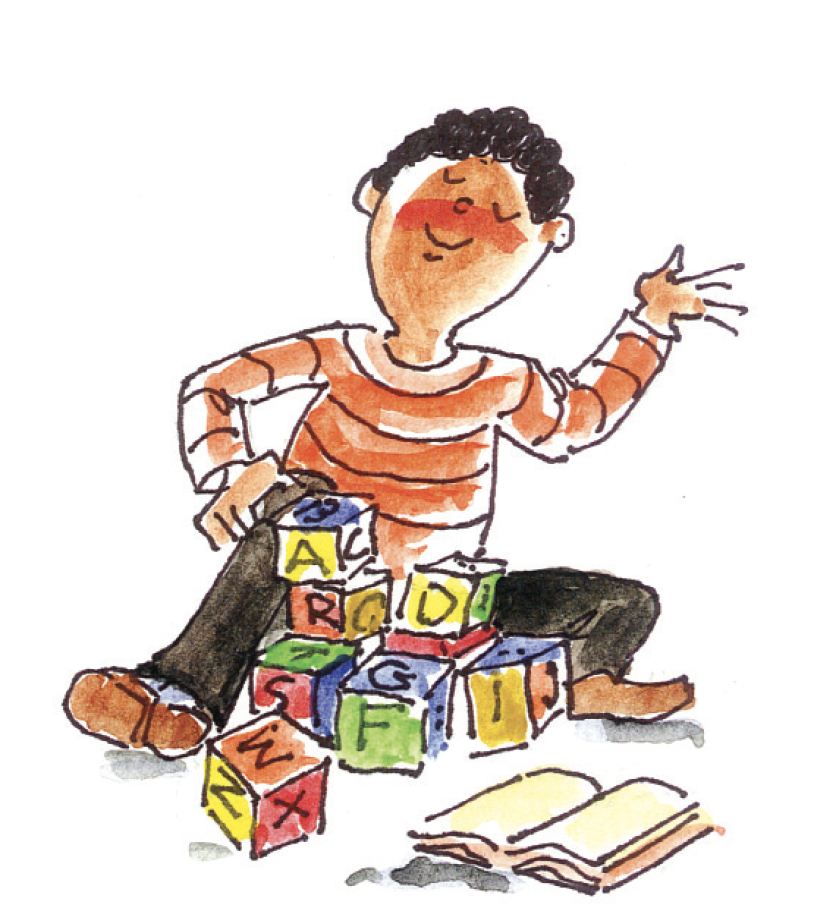
Set aside time for play by themselves - for creativity and to be alone
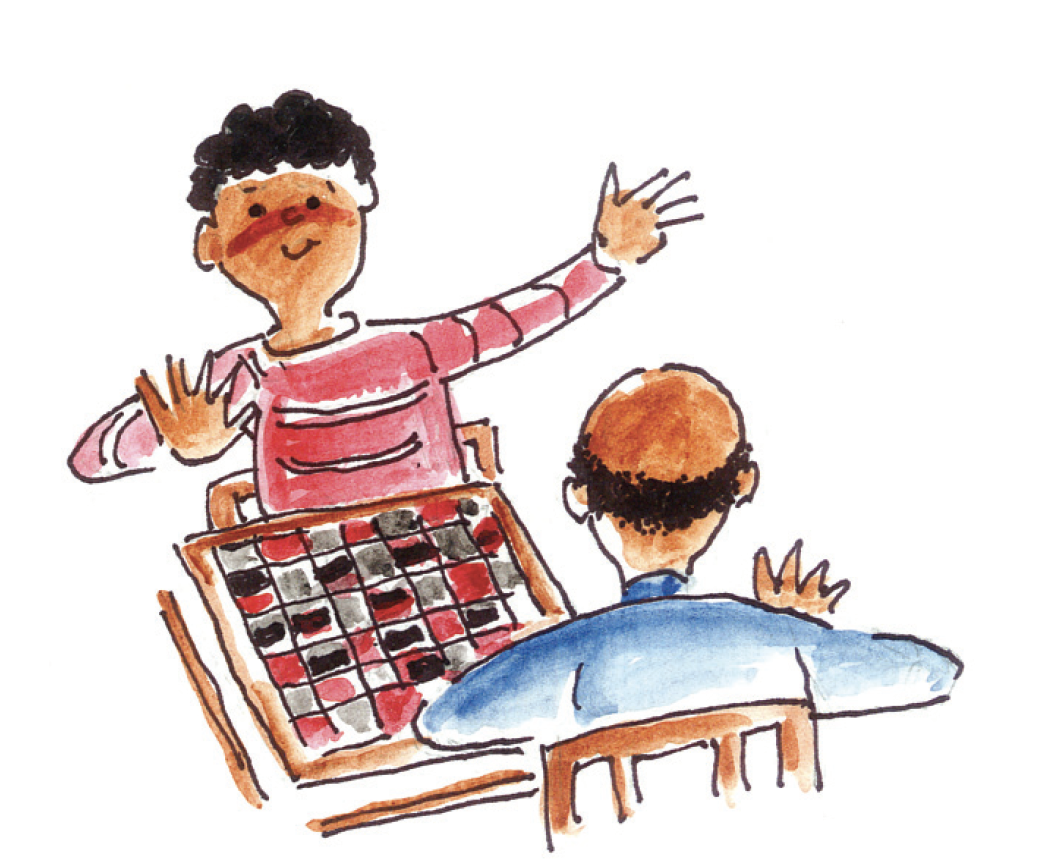
Play games with them - for rules and fun together
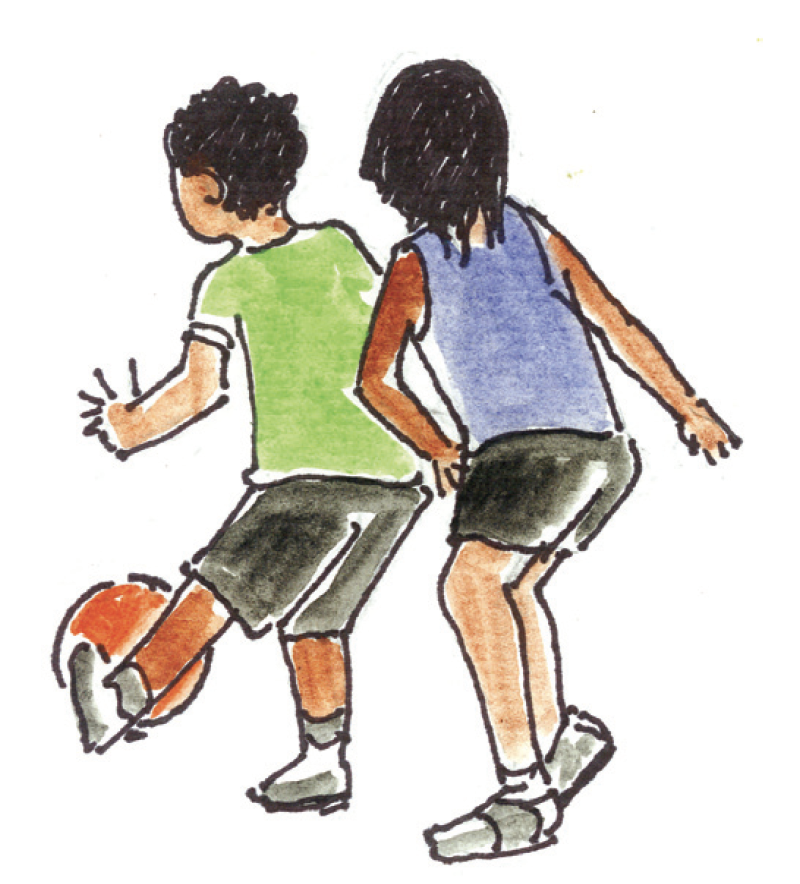
Let them play with other kids - to learn to get along, play fair and compete
Kids need to play. They need it for their minds and bodies to develop. It’s how they learn to get along with other kids. It’s how they learn rules. It’s how they learn how to be creative. It can help them get in good physical shape. It’s also good for you when your kids play because it can keep them busy and out of trouble. You may have to get them started and check up on them, but they learn to do a lot on their own. When kids are in grade school and high school, they need to play for different reasons --- to learn how to win and lose, to learn discipline, to gain a feeling of accomplishment, and to have fun. One good way to think about this is to try and get them into one sport and one kind of art or music in school. The sport and art don’t have to be varsity sports or serious music, but they should something your child can work at and enjoy. Play is sometimes called “the work kids do.” It’s one of the most important things children and as teen agers can do to grow up smart and strong.
Your son or daughter needs three kinds of play :
A book by Stuart Brown called “Play” says kids need three kinds of play:
- Play with you
- Free play by themselves
- Play with other kids
1. Play with you:
Your baby daughter needs to play with you. Play helps her brain and body develop its intelligence and its senses of hearing, sight, taste and touch.
At an early age, look her in the eye, make funny sounds, laugh or sing to her. Gently tickle her, laugh, make funny faces. That helps her feel, touch and move around. After a couple of months, she needs you to hand her a soft ball or a doll and to take it back when she gives it to you. She needs you to watch and respond to her.
Later you can show your son toys or kitchen utensils and give him an opportunity to use as many as possible --- a rattle, a set of measuring spoons, stuffed animals, plastic toys too big to put in his mouth.
Then you can let your daughter push a toy car to you and you can roll it back, or help her put a small doll into a shoe box for a bed when it is her bedtime.
Get a basket for his toys and, every night before bedtime, the two of you can pick up the toys tossed all around the room and put them in the basket, like putting the toys to bed when it is your kid’s bedtime.
When he is a few years older, you can play learning games with him, such as reading and math games or games where he has to make up stories to tell you. You can teach her simple ball-bouncing games or dance together when your favorite music is on the radio.
Card games are great when your child is four or five. Crazy 8 or Go Fish or other card games teach him to think and to follow rules. The games teach him to be a good winner and a good loser. They also show her that she is important enough for you to spend time with her. She will feel better about herself because she knows you care.
2. Free Play by Themselves:
Free play by herself is the second kind of play your daughter needs. Free play is where she becomes creative and learns how to work things out on her own. It is where she learns that turning the page of a book is like a cabinet door swinging open, or that if you stack blocks or cans of vegetables up too high they will fall over. It is where she figure things out for herself and whatever she does is fine as long as it can’t hurt her. It’s where she develops her imagination. It’s also where she learns that she is not helpless, that she can get your attention and she can make things happen.
One idea is to put all your pots and pans in a kitchen cabinet or in a drawer near the floor. Then get a dozen wooden cooking spoons. Your son can play with these while you are making dinner. Don’t mind the noise, that’s all part of the fun. Just be sure nothing is so small that he can put it in his mouth or that he can touch anything that will burn him, and never let him play with plastic grocery bags that can suffocate him.
You can also teach him shapes and sizes and what different things feel like. A can is round, a box is square. An ice cube is cold and a hair brush rubbing his skin feels scratchy. Whatever new things he can experience will help his little mind grow.
Let him play with simple puzzles, too, if you have any, or any other toys you can get. Let him look at pictures and turn the pages of magazines.
When she gets older, put a ribbon in a girl’s hair and let her play she is a movie star, or tie a scarf around your boy’s head and let him pretend he is a pirate. Just let your imagination be your guide and you will think up all sorts of things.
Don’t forget art projects. Cover the table with newspapers, get your daughter some paper and some crayons and see what she can draw. Ask her what it is, and if she doesn’t know, or it doesn’t look like it is supposed to, then compliment her on the nice colors she used or how much fun she had.
3. Play with Friends:
Play with friends is the third kind of play that your son needs. Try and find friends for him that act the way you want him to act. Friends that don’t yell or bite or grab toys, and friends that don’t hit or use bad language. Your son will learn a lot from these friends. Make sure your son learns how to behave the way you want him to.
Playing with friends at your house or their house is how kids learn to get along with others. They learn to work together and how to take turns and to make friends. Since most games have rules, they also learn to follow rules. Be sure you know the other mom will watch them carefully
You can use play to teach your son manners. Show him how to trade a toy they want for one the other kid wants and tell him how proud you are of him for sharing. Keep him them from hitting or yelling and show them how to talk out their problems instead.
Your daughter also can play pretend games with a friend for hours. They can race cars and play with dolls. They can make forts out of pillows and chairs and do all sorts of things. When they are older, even a big cardboard box with a hole cut for a door and another one for a window can be a make-believe post office or grocery store.
Setting up play groups where your daughter has a friend over after school helps her learn to play with others. It gives you free time, too, when they go to the other girl’s house for a play date there.
Dad’s play with kids usually is a safe way to have rough-and-tumble play and to take some gentle risks. When your daughter is very young, you can play airplane and lift her over your head and turn her around. Be sure she is laughing and enjoying this game, and not afraid of it. Moms can do this too, of course.
As a dad, you can toss a ball to your baby son and try to catch it when he throws it back, or have a make-believe wrestling match with your daughter and lets her win once in a while. You can also teach her to “tap out” by tapping you three times as a signal to release her. That teaches her she has the right to tell people to stop when she is tired of a game.
You can help your son learn to keep trying. If you are play-wrestling and you are winning and he gives up, tell him never to give up, then let him throw you off and win that match.
Dads sometimes let their kids take more risks than Mom’s do. Things like jumping off a step into the grass of turning somersaults at an earlier age, or encouraging them to go down a slide at the playground.
Be sure never to lose your temper or lose control when playing with your kids. It’s a game and both of you need to enjoy it. Also find a way to slow it down if your daughter gets out of control. You need a signal that the game has to be over now. But the most important thing is to enjoy the game and your time together.
A woman I know who raised three great kids told each of her children that they had to be in one art and one sport. The kind of art she was talking about could be drawing with crayons or painting with finger paints, or it could be music, such as playing a musical instrument in school or singing.
Whatever art your child chooses, be sure she chooses one and works at it. It will help her learn how to be creative and how to express her feelings. It also helps her learn how to work with her hands, and how to spend free time instead of watching television or playing video games. If your daughter goes on to practice her art in high school, it may lead to her feeling really good that she can do something well, or it could lead to studying art in college and maybe getting a job in art.
Sports teach kids self-confidence. They teach habits of hard work. They teach that it’s okay to lose a game as long as you get back up and try to win the next one. It’s the activity that’s important as well as trying to win the game.
If it’s a team sport, it teaches your daughter how to work together with other kids. It shows her how much fun she can have working at something and being successful.
Sports keep kids physically active. It gives them lots of exercise. It helps prevent obesity and teaches them to follow rules. Any good team has training rules --- be in bed by a certain time, eat healthful foods, know what your job is and do it so you don’t let the team down. Learning how to follow rules is an important part of growing up.
Few things have as much benefit for your child as being in one art and one sport and doing their best in them. Adora Mora, for example, was very involved in sports as well as dancing and performing. She played basketball and was on the high school volleyball team. She went to a summer program put on by a group called FACE (an African-American group called “Friends of Art for Community”) where the kids were taught to work hard in dance and performing groups. She said the discipline and learning that if you worked hard you could get good at something were great lessons for her.
Jeff Prairie and his brothers all played football in High School. His dad told him that he could not afford to sent him to college, and if he wanted to go he would have to earn a scholarship. Football and part time jobs put him through college.
4. Build self-esteem and resilience
Praise something good they do every day
Teach them it is okay to fail and to try again
Give them choices to make
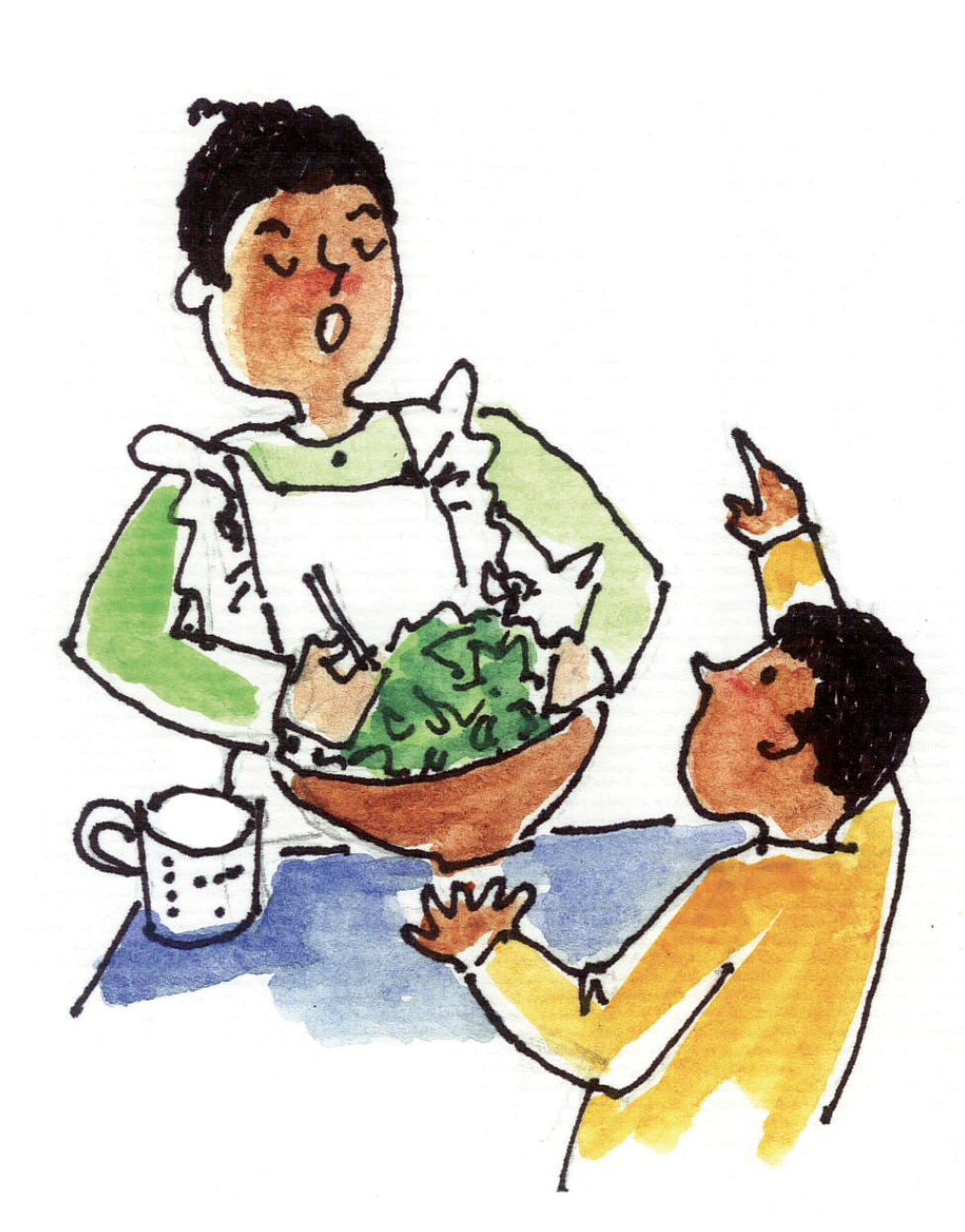
Let them help around the house
Tell them you love them and make time to be with them
Tell them stories about hard times in your life and how you got through them
Self-esteem is how a person feels about himself. It is whether he feels like a good person or not, whether he feels valuable, whether he thinks he can solve problems and overcome obstacles.
Resilience is how your daughter can bounce back from failure or tough times. Does a failure make her feel like a failure, or feel like a strong person who just happens to have failed this time? Is she willing to work harder next time in order to do better? Does she give up and think she’s a bad person when things go wrong, or does she bounce back and keep trying until she succeeds?
Self-esteem and resilience help you son deal with the world. “Kids who feel good about themselves seem to have an easier time handling conflicts and resisting negative pressures. They tend to smile more readily and enjoy life. These kids are realistic and generally optimistic”, according to a website called Kidshealth.org.
Helping your daughter develop self-esteem and resiliency is complicated. Basically it is showing her that she is valuable and that she can accomplish things. It is something you do a little bit at a time in a lot of different ways.
Some of these ways shown below are my ideas, and others are from Kidshealth.org and a website called familytlc.net and a book “Grit, Curiosity, and the Hidden Power of Character” by Paul Tough.
Things you can do to help her are:
- Try to create a safe, loving home environment. Kids who don’t feel safe or are abused at home will suffer from low self-esteem. Stress keeps kids from developing resilience. They are too consumed by their everyday lives to do a good job on new activities.
- Make time for her. Spending time with your daughter shows her she is loved and valuable.
- Be empathetic. Instead of saying “Don’t feel bad” when something happens, say something like “You look sad. I know how bad it feels when something like that happens,” or “I know it hurt when your Dad took that splinter out of your hand,” instead of ““He did it for your own good.”
- Give her chores and projects that are difficult or challenging for her, but are things that she can do. In other words, give her tasks where she can succeed.
- Let her make decisions. When young, keep the decisions simple, like “Do you want to wear the red or the blue shirt?” As she gets older, let her make bigger decisions. Making decisions lets her feel some control, lets her feel her thoughts are important, gets her ready to make bigger decisions, allows her to fail and find out it is okay, and show her she can bounce back from a bad decision.
- Find something she has done that you can praise every day, but don’t overpraise. Kids catch on quickly if you praise a result that is too simple or something everyone does naturally.
- Teach her that it’s okay to fail. One Father I heard of asked his children every night what they had failed at that day. He wanted them to take chances even though some of the chances might not work out. His daughter later took a chance, started a small business, and became a millionaire.
- Remember, character is created by encountering and overcoming failure. Mistakes are opportunities for learning.
You can also:
- Help your son learn persistence. Encourage him to try again when he fails, and again and again. Then praise him by telling him how hard he tried to gain his success.
- Give him opportunities to contribute, such as helping to clear the table after dinner, or participating in a hunger walk or a food drive when he is older.
- Tell him he can get through bad things when they happen to you or to him. Show him how to sit down and make a plan.
- Don’t solve his problems for him, but help define the problems and come up with alternatives
- Focus on the process of trying more than of the outcome. For example, point out how hard your son worked to get his block tower taller even though it finally fell over.
- Try and redirect his negative beliefs. If he says” I’m bad at math”. Say: “You are a good student. You do great in school. Math is just a subject that you need to spend more time on. We’ll work on it together”.
- Help him become involved in constructive experiences. Mentoring a younger child is good for an older child. Activities where kids have to cooperate are good.
You can see that helping your daughter build resilience and self confidence is a combination of being a good example and gradually giving her jobs where she can succeed or where you can help her try again when she fails. You can’t do it right all the time. But if you realize they learn from everything you do and everything you have them do. You’ll be off to a good start.
5. Create routines and structure
Make a morning routine to get up, dress and eat
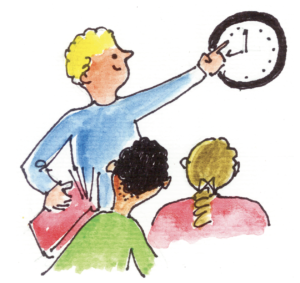
Have bedtime rituals (bath, storytime, bed - no electronics) at the same time every night
Create family traditions for holidays and regular together time

Have family dinners together
Routines, which are experiences that you repeat over and over again, help your daughter know what to do and when. They help her know what to expect and to learn more quickly how to behave. They become familiar and help her feel more secure.
Three of the most important routines for your daughter when she is a baby and when she gets older are:
- Morning rituals
- Bedtime routines
- Having family dinners together
When babies are born, they don’t know hardly anything except how to suck, cry, pee and poop. They don’t know that we like to sleep at night and be awake during the day. They don’t know that we like to eat breakfast, lunch and dinner at certain times. They don’t know when to make noise and when to be quiet.
You have to teach your child all of these things. One way to do it is by developing some patterns that you repeat over and over until your son learns how things are done. The more your daughter knows what to expect, the more she will be able to accept what you want her to do.
Morning routines and bedtime rituals are especially important.
Morning routines:
When your daughter is older and starts day care or school, a morning routine helps her get out of the school with less stress and confusion. It will help her get her day started. A simple morning routine might be like this: Get up at 7 am, go to the bathroom, get dressed, eat breakfast, brush teeth, then play or watch television until it’s time to leave for school.
Bedtime rituals:
All children are different. Some children go to sleep easily and others have a hard time. They cry and want to jump around. They just don’t want to give up the day. Others are happy to curl up and go to sleep, and you can help them do this by preparing them for bedtime. Lots of books have been written about how to deal with children who don’t want to go to sleep, however, and experts have different ideas on how to help them. If your child doesn’t like to go to sleep, you will have to try different methods of helping him until you find what that works.
One of the most helpful routines you can have for your son how you put him to bed. Here’s how you can do it:
- Plan bedtime so it’s the same time every night
- Tell him when it’s bedtime and that he will have a bath, reading and then to bed
- Start with a warm bath, where he can splash and work off some energy
- Follow the bath with a quiet time when you read to him
- When he is older, let him pick out a favorite toy or blanket to take to bed with him
- Then give him a hug and put him in bed. Some children like their room to be dark and others like some light. Some like the door open and others want it closed. You will figure this out over time and can make the room the way that works best for him.
Family Dinners:
When your child gets a little older --- say five or six or older and later when he is in school --- sit-down family dinners can help him in more ways than you might imagine. It doesn’t have to be a fancy meal, and even if you can only do it a few times a week that’s much better than none. The important thing is that everyone sit down together with no TV and that it isn’t rushed. One of the big benefits comes from having time for everyone to talk.
Here are some of the benefits that experts say family meals together bring:
- Everyone eats healthier meals.
- Kids get better grades
- Kids are less likely to become obese or fat
- Kids have lower rates of alcohol and cigarette use
- They have better relationships with their parents
- They have better overall mental health.
All these things happen because of better eating habits and more communication with parents. Family meals are where family stories and values are passed on and where children can talk about their days and get help in solving problems they face.
A study by Diane Beals at Harvard found that mealtime conversations during the preschool years are a strong influence on literacy development and are important in children developing early language skills. (Diane E. Beals, “Eating and Reading: Links between Family Conversations with Preschoolers and Later Language and Literacy,” 2001.)
The longer these meals last the better. A 10 minute meal won’t help all that much, but it is better than nothing. To make meals last longer, try letting the children help with preparing the food, then serving the meal in courses, and going around the table and asking each adult and each child to tell the best and the worst things that happened to them that day. You can also discuss the news from the neighborhood or about friends and family.
When David Scott’s foster parents told the kids it was time to go to bed, they knew what to expect. When Iliana Rodriguez’s parents drove North each summer, she knew what the trip would be like and what to expect. When Adora Mora was growing up, she knew each Sunday was going to be spent at Church and with her family. All of these routines helped them deal with the changes they were facing.
Jeff Prairie and his family had family dinners together every night. His dad demanded that dinner be on the table when he got home. Adora Mora and her sisters had to prepare the dinner on nights when their mother had to work late. Family diners may have been what helped these people develop strong values, a sense of who they were in the world, and that their families cared for each other.
6. Have rules, discipline and rewards
Explain the rules and the reasons for them
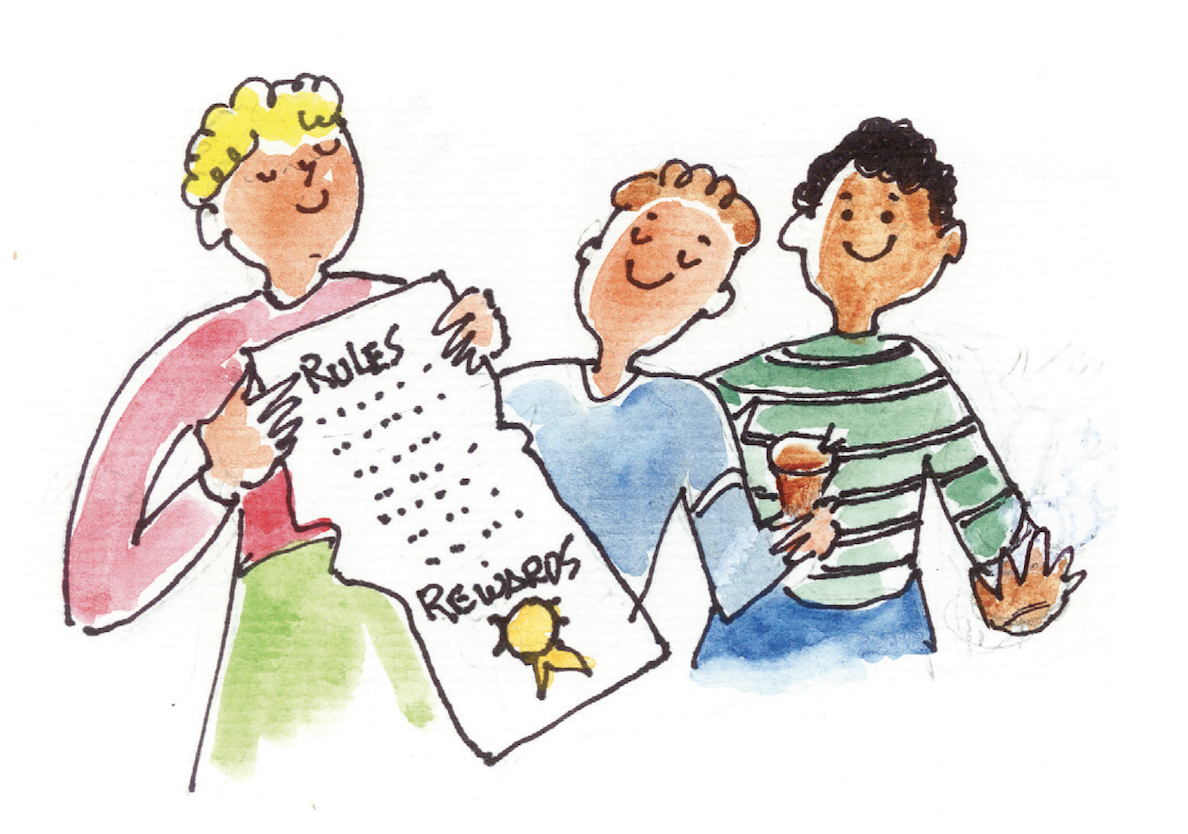
Be consistent
Praise good behavior
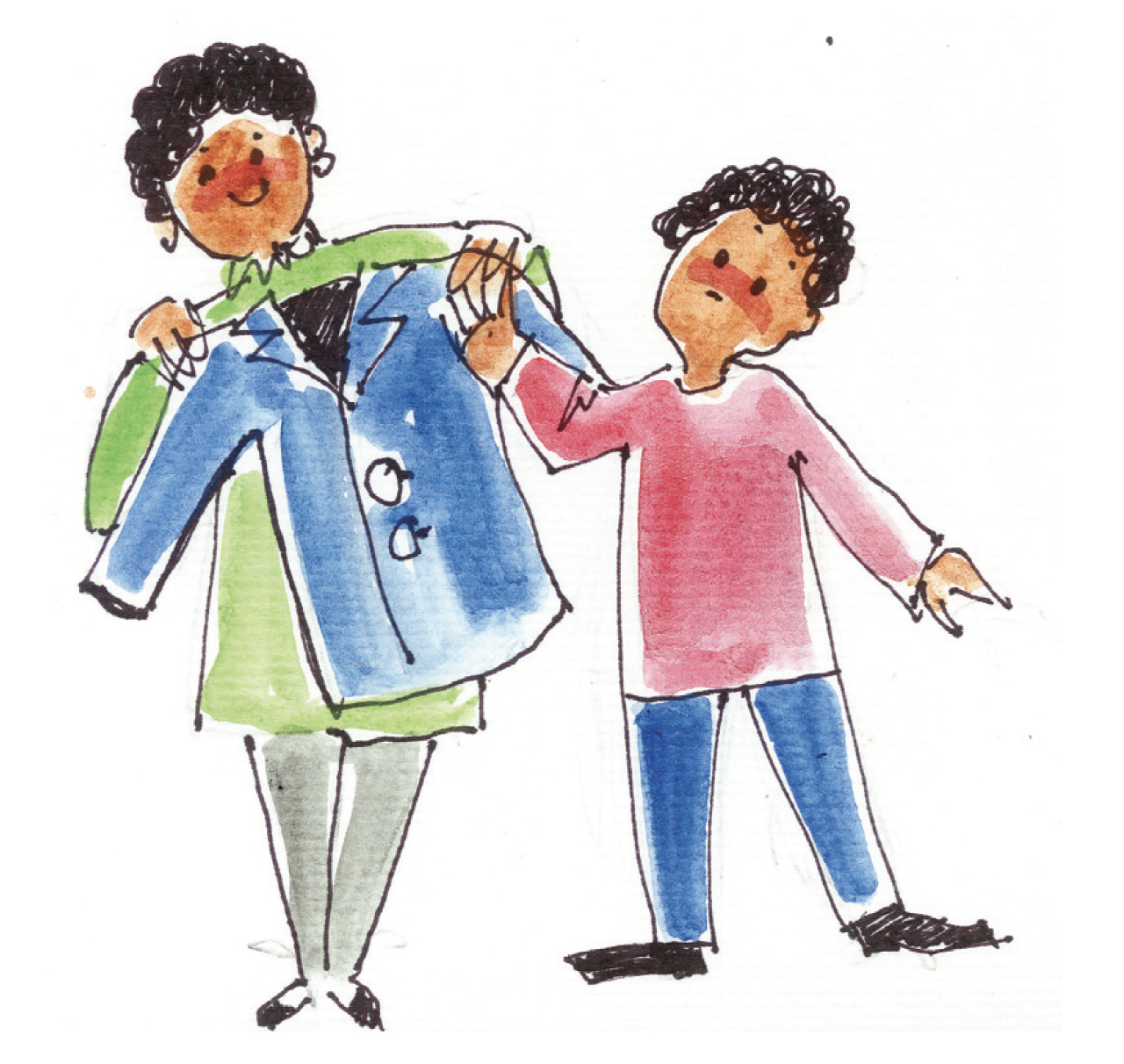
If they disobey, redirect them - don’t hit, spank or yell
How does your son know what is right and wrong? How does your daughter know what is dangerous or safe? One way is that you can reward her when she does something good and discipline her when she does something bad. That’s how you teach her to behave. Consistent rewards and discipline, over and over, will make both your life and your child’s life much better.
When children are born, they don’t know what’s right or wrong or what they are supposed to do. About all they know is how to eat, poop and sleep. They have to learn everything else. You start to teach them with nurturing care so they learn they are loved and they want to please you.
When your daughter is very young, routines such as consistent mealtimes or bedtime rituals (a bath, reading, and tucking into bed at the same time every night) help her learn that there is a structure to her life. As she gets older, she will want to explore and try new things and she doesn’t know what is allowed and what is not. You will need to give her a calm and consistent “no” or “that’s not for babies” when she does something wrong or dangerous. Then remove her from the situation or distract her with another object. Even if you get angry, staying calm in front of your son will help him stay calm.
When your son is a little older, say about nine months, he needs a consistent and calm “no” when he is doing something he should not do. You need to be clear when you tell your son he can’t do something. Say “No, you can’t touch the stove because it is hot and will burn you.” Then lift him up and take him away from the stove. You will have to do this again and again until he learns it himself. Then he may walk up to the stove, say “Hot,” and look to you to see if you praise him for it. Once again, your son wants to please you and to have you praise him.
That’s how young children learn right from wrong — you tell them over and over, remove them from the situation when they won’t stop, and praise them when they do what you want.
Most of us don’t realize how much the way you reward your son or daughter will help them grow up to be happy and successful, and will help you my making them easier to raise.
- If you reward your daughter for good behavior and for accomplishing things, she will want to behave better and to try and learn new things.
- If you praise your son for doing good things, or for being nice, he will gain self esteem and feel that he is a worthwhile person
Most of us don’t realize how much the way you reward your son or daughter will help them grow up to be happy and successful, and will help you my making them easier to raise.
- If you reward your daughter for good behavior and for accomplishing things, she will want to behave better and to try and learn new things.
- If you praise your son for doing good things, or for being nice, he will gain self esteem and feel that he is a worthwhile person
On the other hand
- If you yell at your son, he will learn it is ok to yell back at you or at others
- If you hit your daughter, she will learn that it is okay to hit
- If you hit your son, he may become afraid
- If you punish your daughter her too hard for little things, you won’t have any stronger tools if she does something really bad
Kids have to know what is right and wrong, and you have been teaching them by modeling good behavior and telling them all their lives. Another way to help them think about more it is to teach them to follow something like the Golden Rule. Almost all religions have something like the Golden Rule, which says “Do unto others as you would have them do unto you.” Tell your son to ask himself if he would want someone else to do to him him what he is going to do, and then not to do it if he wouldn’t want it done to him.
Another way of doing the same thing is to teach empathy to your daughter. Empathy is putting yourself in the other person’s shoes and thinking about how they will feel if you do something. “How will Mom feel if I draw pictures on the wall?” How will Dad feel if I put his keys in the toilet?”
Good manners are also necessary in our world. They will help your daughter be more liked and more respected. They will make her look better in the eyes of adults and make your own life easier. Good manners include things like:
- Always say ‘Please,’ ‘Thank you’ and ‘Excuse me.’
- Be polite on the phone
- Listen when others speak and respond clearly when spoken to
- Wait your turn to speak and don’t interrupt others
- Look someone in the eye and shake their hand when you meet them
- At the table, do not slurp your food, do not talk with your mouth full and don’t say you hate the food
- Help others. Always be kind, polite and courteous
- Be a good sport. Everybody likes to win, but even if you lose the game, be a good sport about it.
Don’t spank or yell:
Do not spank your child. Most experts say that children should not be spanked. They say it makes them afraid and teaches them that it is okay to hit other people. It can physically hurt them. It humiliates them. It makes them more aggressive. And it can even create stress that damages their brain.
A study by Murray Straus, a university sociology professor, showed that spanking lowered children’s IQ and made them less smart, probably because of the stress it caused. It damaged their brain cells and it didn’t teach them why something was bad, like having discussions with their parents about what they did wrong might have done. Moreover, the more you spank your daughter, the less effect it will have because she learns she can survive it. All these reasons are why experts say spanking is not okay.
This was backed up by another study that shows that kids are smarter if they aren’t spanked. Why? No one knows for sure, but it is probably because they aren’t as afraid of their parents, they ask questions, and their parents have to talk to them about behavior instead of just hitting them when they do something wrong. The bond between children and their parents is also stronger when they aren’t spanked.
And another study shows that children who were regularly spanked at age 3 were “50% more likely to be bullies, get into fights, be destructive or disobedient, attack people or scream a lot at age 5.” Is this the way you want your son or daughter to be? A bully? A child that gets into fights and is destructive and disobedient? Of course not! So try not to spank.
Even though all that is true, over half the adults in the US thinking that spanking is certain circumstances is acceptable. And most of the people whose stories are in this book say they were spanked. One said he dreaded coming home after getting a bad grade on a test because he would get spanked. Another talked about her dad getting out an aluminum baseball bat to use on the kids. Even Supreme Court Justice Sonia Sotomayor in her book “My Beloved World,” talks about getting “walloped” by her parents when she did something wrong. I also remember being spanked once when I was a boy. I was three years old. I crossed the street without looking and could have been hit by a car. My Dad had told me not to cross streets. This time he picked up a small tree branch and swatted me across the legs. It hurt, and I never crossed the street alone again until I was older.
But what do you do if your son runs up to dangerous dogs that might bite, or runs out into traffic in the street, or something else that looks fun but is dangerous. Although I think spanking in general is bad for kids, and you should never hit a child hard, I also think that once in a great while, especially if it is necessary for safety, a “swat” that stings or smarts might not be so bad.
When and how do you discipline your baby:
Discipline is something you can do in gentle ways or more strictly, depending on what you think is necessary. Here are some ideas you can think about:
- Don’t punish your son for crying. Babies cry because they are trying to tell you they are hungry, or tired, or wet or in pain. That’s the only way he has to tell you. He is not trying to irritate you. The most important thing you can do when your son is crying is to respond to him in a loving way.
- When your son is getting close to one year old, he will try to see what all he can do. He doesn’t know yet what is dangerous and what is not safe to do. When he does something you don’t like, try and redirect his attention to something else. Say “That’s not for babies,” and put whatever it is up high on a shelf. Or move him to another room and find something else for him to play with.
- When your son is one or two he or he will have some temper tantrums. That’s normal. It means he is out of control and needs help. Sometimes the best thing to do is make sure he is in a safe place, then just walk out of the room until he calms down.
- If a tantrum occurs in a public place, you may have to take your daughter outside until she can calm down. It is really hard for you to quiet her down if you are embarrassed, so remove her from the situation until she can calm down.
- Don’t tell your son he is a bad boy when he is doing something wrong. Instead, tell him you love him, but that you don’t like what he is doing.
- When your daughter is two or three, you can talk with her more and reason with her. She is very smart and will know if you mean what you say. Don’t yell at her, but tell her what you want for her to do in very simple terms.
Time-Outs:
When your daughter gets older, you will need other forms of discipline. One of the best is time-outs.
Time-outs are where you put your daughter on a chair or in her room for a little cooling off and isolation. They don’t have to be for long. Dr. Roger McIntire, who has written many books on parenting, says “Many parents have found the act of starting the time-out, the act of putting the child in the chair or room, is the effective part. Ten or 15 seconds is enough for two-year-olds, and one minute is enough for four, five, and six-year-olds.”
Other Ways to Discipline:
Modeling good behavior and praising your daughter when she does something good are both ways to teach her how to behave.
For a young child, you can take away a favorite toy(you can have this back when you have picked up your clothes),
As kids get older, two other ways to discipline them are: taking away privileges and grounding them.
Taking away privileges means to take away from your daughter something that is important to her. Tell her how long she will lose it and don’t give in and return it too soon. Be consistent and stick with what you say. For a young girl it can be a special toy. For an older boy it can be a computer game or TV privileges.
Grounding often works for teen agers. Tell them if they do something wrong, they will be grounded and have to stay in the house or only go out for school or planned activities, such as sports or after school classes for a certain number of days. Be consistent and stick to what you said. Also tell them it is their behavior that is bad and not them. Remember, you are their parent and you know what is right and wrong.
One way to reward your son is to reward good behavior. The National Research Center for Women and Families says that you should “…be sure to use praise, hugs, and other rewards for the behavior that you like. A calendar chart (with gold stars or stickers for younger kids) can also reinforce the behaviors you want your son to do every day, such as going to bed on time or putting away their toys.”
There are other ways every day to reward and encourage your daughter. Here are a few examples:
- Catch her when she is being good and praise them, like “Sabrina, it’s so good of you to help your little brother like that.”
- Praise him for trying to do something well even when they are not successful. “Willie, you really worked hard to get your shoes tied.”
- Help her take chances in a safe way, like saying “I know you want to reach that high shelf, but let’s use this stool instead of climbing on the bookcase.”
- Support them when they are trying hard to do something. “Jackson, you’re really trying to stand up. You can do it holding on to the chair and pretty soon you can let go and walk to me.”
- Give him rewards immediately for doing something you told them to do. “Alicia, you ate all of your carrots. Now you can have the cookie I promised you for desert.”
- Give him kisses and hugs as well as praise. “Here’s a hug, Sammy, for putting your coat in your room. Thank you very much.”
- Praise them for specific things. “It’s great you drank all of your milk.”
- Praise her for keeping on trying, even if they fail once or twice. “What a tall stack of blocks you made, Erin, and you had to try and try before they didn’t fall down.”
To summarize, both praise and discipline can help your child do better growing and can make your life easier. Remember to:
- Praise him or her for specific things
- Encourage them to grow --- explore and find things out on their own as long as they are safe
- When they do something wrong, remember it is the behavior that you don’t like, not the child
- When your child is young and doing something wrong, try and distract him or get him interested in something else
- Don’t spank
- When your child is older, use “time-outs” as a way to discipline him
- Do not yell at them or hit them unless it is an emergency
- Remember that praising your boy or girl for good behavior can make her want to do the right thing as well as punishing him or her for bad behavior
7. Take them places
Take them to parks or on neighborhood walks
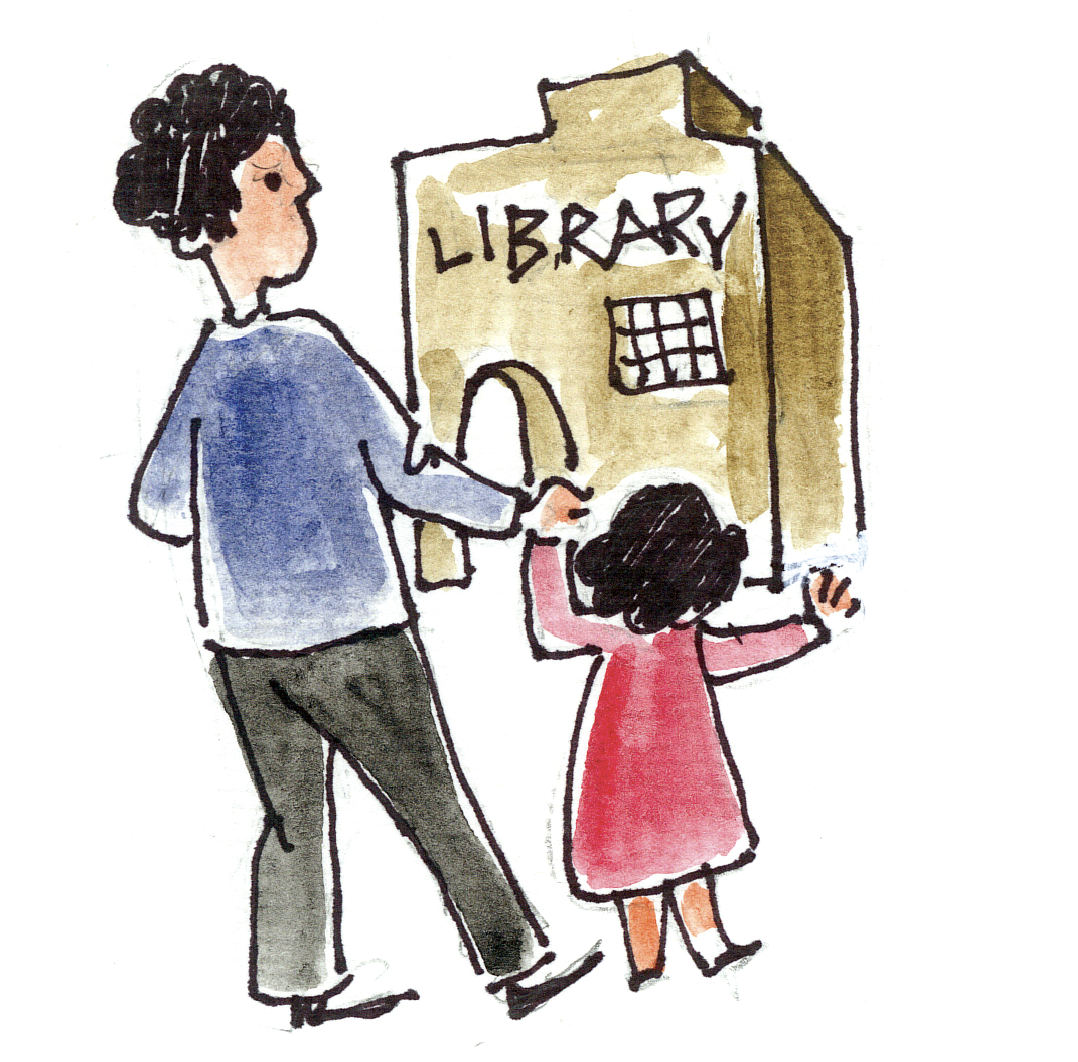
Go to the library and get books
Visit friends’ or relatives’ homes and take family trips
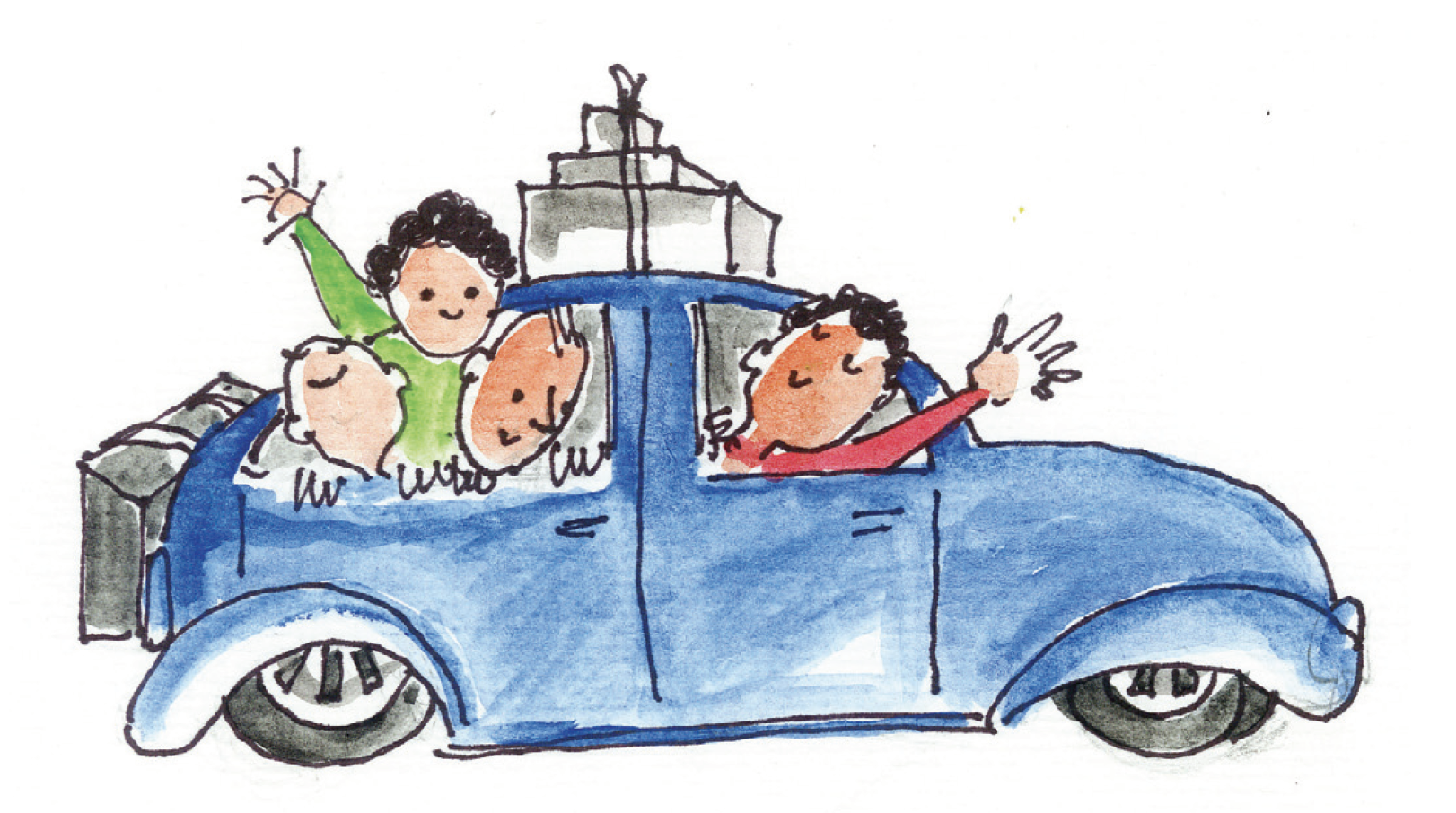
Visit museums or zoos
The world is a big place full of wonderful places and things to see. Showing your daughter any places outside her world will help her understand more about the world. With luck, it will also make her curious and want to see more. As surprising as it may seem, there are teen agers in Chicago who have never seen Lake Michigan (at the East edge of the city) and in New York City who have never seen the ocean. In these cases, all it would take is a bus ride to get them there. Any kind of trip expands your son’s world. Trips show him new sights. Trips make the world more familiar and more manageable as he gets comfortable with different places Examples of trips you can take with your child are:
Trips that help your son can be anything. Think of these:
Walks around the neighborhood. When your baby is young, go for walks around the neighborhood. As he gets older, introduce him to the family next door, to the postman, to the person that runs the little store on the corner. Teach him he is in a neighborhood with other people just like he is.
Bus trips to the store. Many times you may take bus or car trips to run errands. Point out things that you see on these trips. Tell her the names of what you see (“Look at the big dump truck,” or “Look at the blue car”) or ask her questions (“What color is that building?). If it’s a long bus trip or one you take it with her child every day, bring along a book to read to her. Find these trips that mean something to your daughter, like a bus trip to the hospital where she was born and point your room out to her, or take a trip to the school she will go to some day.
Trips to the library. Find the library nearest you. Find the children’s section in the library and introduce your self to the librarian. Ask her name. Don’t be shy. It is the librarian’s job to help you and your daughter and they love doing it. Then introduce your son to the librarian by name. Have him look at the librarian and say hello and shake her hand. This may sound silly, but it is important. Ask the librarian what books she thinks your son would like to read. Get a library card and check out a couple of those books that your son likes. Ask if there is a free story hour and see if you can bring him to hear the stories.
Trips to museums and playgrounds. Almost all towns have museums and playgrounds that kids should see. If these place charge admission and you can’t afford it, ask if they have days when it is free to go in. Take your daughter again and again, so she gets used to the place and feels familiar there. Ask her what she likes the most and take her back to see her favorites. When she gets older, see if the museum has free lessons or classes she can take.
Trips to visit family. If possible, take your son on a driving trip to visit relatives. Or see if there is a train trip that doesn’t cost too much where you can ride one way for a couple of hours, get off and eat a lunch you brought, and come back the same day. Trains are a big adventure and your son will love them. Also see if there is a special place nearby you would like to show him. While you are traveling, tell your daughter stories about your family or the places you are going to see.
Trips with other kids. When your daughter is older, find out if there are Church trips or Boy or Girl Scout Camps or Boy’s or Girl’s Club trips she can take.
Most of the people I talked to who had come so far in their lives had been taken on trips when they were children. Adora Mora’s parents took their family on cross-country car trips every year to visit family. They talked and sang songs and told family stories on these trips. Illiana Rodriguez’s family drove to Michigan every spring and back to Texas every fall. David Scott’s mother took him on bus trips all over the city. He also took a train trip to Iowa with his Mom when he was six or seven and had to take charge to get them back home when she had a spell. When he got older, he took busses all the time by himself. David Tippiconic’s father took them back to Oklahoma every summer to spend time with their relatives and with their tribe. That’s where he learned so much about his heritage. All of these kids knew there was a bigger country out there than just their neighborhood.
Remember: Any kind or trip will expand your son or daughter’s world and prepare them to learn and experience new things. Try things like:
- Walks around the neighborhood
- Car trips of bus trips to the store
- Trips to the library
- Trips to museums and playgrounds
- Trips to visit family
- Trips with groups of other kids
8. Help them succeed in school
Praise them for hard work
Talk about how important education is
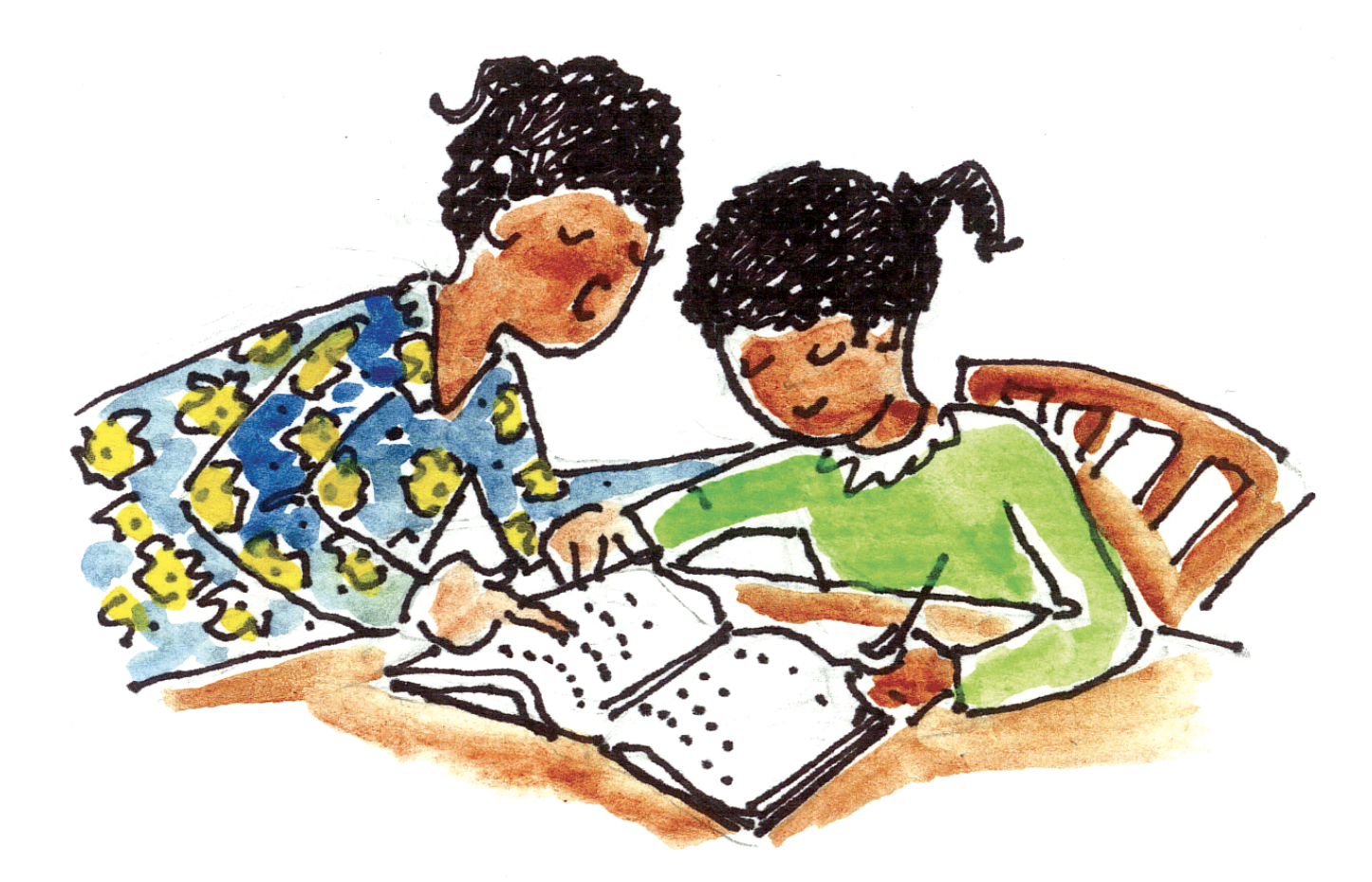
Discuss future plans for college or career
Get to know and share information with their teachers
Education is the surest way for your child to get a good job, to making a good living and to living a fulfilling life. The schools can’t do it alone, however. You must prepare your kids for school, you must teach them to work hard and not give up, you must check up on their homework and encourage them, and you must be involved in their school so they don’t get lost. Studies show that when parents are involved with their child’s school the students have higher grades and graduation rates, better school attendance, increased desire to work hard, lower rates of suspension and decreased use of drugs and alcohol. Being involved with your child’s school is more important to their successful education than how much money you have or your own education. Education also pays off in the cold, hard cash a person will earn in their lifetime. Studies show that kids with high school educations make much more money over their lifetimes and have an easier time getting jobs than kids without high school educations, and people with college degrees make much, much more. In 2015, the US Bureau of Labor Statistics said that kids with a high school degree earned about half again as much as kids who did not graduate, and college graduates earned over twice as much as high school dropouts. Over a lifetime, that really adds up.
Most of the steps in this book help prepare your kids to do well in school. Being a good reader is critical for success in school, and the more you read to your son, the better reader he will be. Knowing lots of words and having a good vocabulary is important, and the more you talk to your daughter when she is young, the better vocabulary she will have. Problem solving is important, and the more you give your child choices and problems to solve on his own, the better problem solver he will become. Hard work and sticking to a job are important, and the more you give your child jobs around the house and encourage her not to give up, the more she will work in school.
What you show and do in your daily life can help your son develop positive attitudes toward school and learning and to build confidence in himself as a learner. Showing your son that you value education and use it in your daily life provides him with a powerful model and contributes greatly to his success in school.
There are three really important things you must do to help your child in school, in my opinion and according to an organization called “Colorin Colorado”. They are:
- Have high expectations:
- Tell your daughter you know she can do well in school
- Tell her she will have to work hard and you will help her
- Tell your daughter her teacher is there to help her. Tell her to ask questions if she can’t understand something.
- Remind her how important education is
- Be involved with the school. Go to your son’s parent-teacher conference and meet his teacher. Don’t be afraid to ask your son’s teacher questions about what you can do at home to help. They are there to help you and will really be glad you are interested. You can also:
- Meet your son’s principal and let her know who you are. Remember, the principal and teachers are there to help your daughter or son. If they know you care and appreciate them, they will care more.
- Meet the bus driver and introduce your son to him
- Volunteer to help in the classroom if you aren’t working and have the time
- Join the PTA if you can make the time so you will know what’s going on with your son’s school and to get to know other parents
- Meet your son’s principal and let her know who you are. Remember, the principal and teachers are there to help your daughter or son. If they know you care and appreciate them, they will care more.
- Get to know your child’s classmates and their parents. It is a good way to find friends for play dates and parents to check out what you hear about school.
- Be aware of what’s going on in the school and after school. You have to know your daughter’s homework assignment to help her. You have to know when she is having a test to be sure she studies. You have to know her friends. Who is she hanging around with? Have the friend over for a play date or a dinner some night to get to know what they are like. Is this who you want your daughter to be with?
- Don’t say bad things to your daughter about her teacher. Back the teacher up if your son did something wrong and they disciplined him
- Ask the teacher about it if you think he is doing something wrong and give him a chance to explain.
- Tell your son’s teacher thank you for what she is doing. Show her that you appreciate her.
- Don’t be shy. The teacher is there to help your child and to help you. You are a team and you need to work together.
- Tell your son’s teacher thank you for what she is doing. Show her that you appreciate her.
- Help with homework
- Ask your child what homework she has and see if you can help her if she is having problems. Sometimes today’s homework is so complicated that you can’t understand it, either. If that is true, call the school and ask how they can get extra help for your child. Try hard not to let your daughter fall behind. Sometimes kids never catch up if they fall too far behind.
- Be sure your son finishes all of his homework every night. Check it when he is finished and help him correct it if it is wrong.
- Teach your son good work habits by making him finish his homework before watching TV or playing video games or going out to see his friends.
- Help him prepare for tests of get started on projects before he last minute
- Advocate or stand up for your son.
- Learn your rights
- Let the school know your concerns
- Apply for special services if you think your daughter needs it
9. Make sure they have caring adults in their lives
Build relationships with other children’s parents
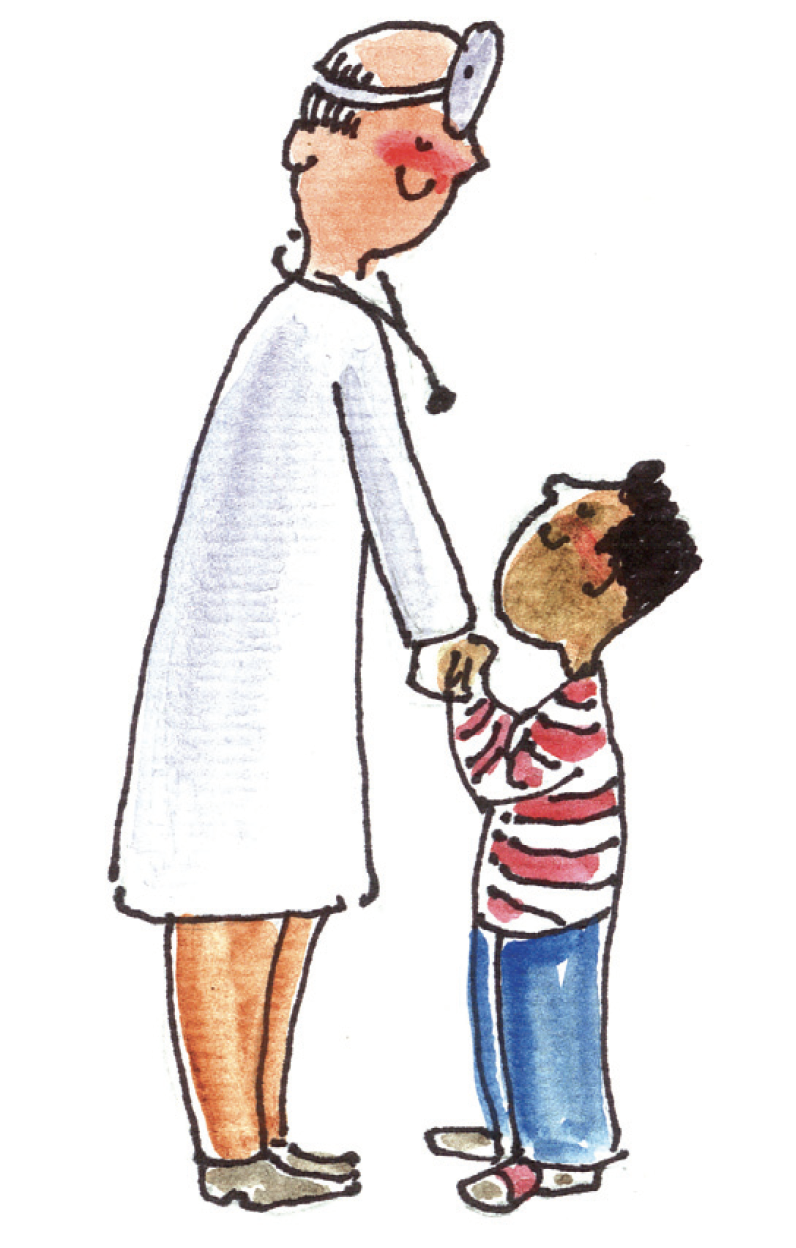
Introduce them to your neighbors, crossing guards and store owners
Enroll them in youth programs run by community or religious organizations
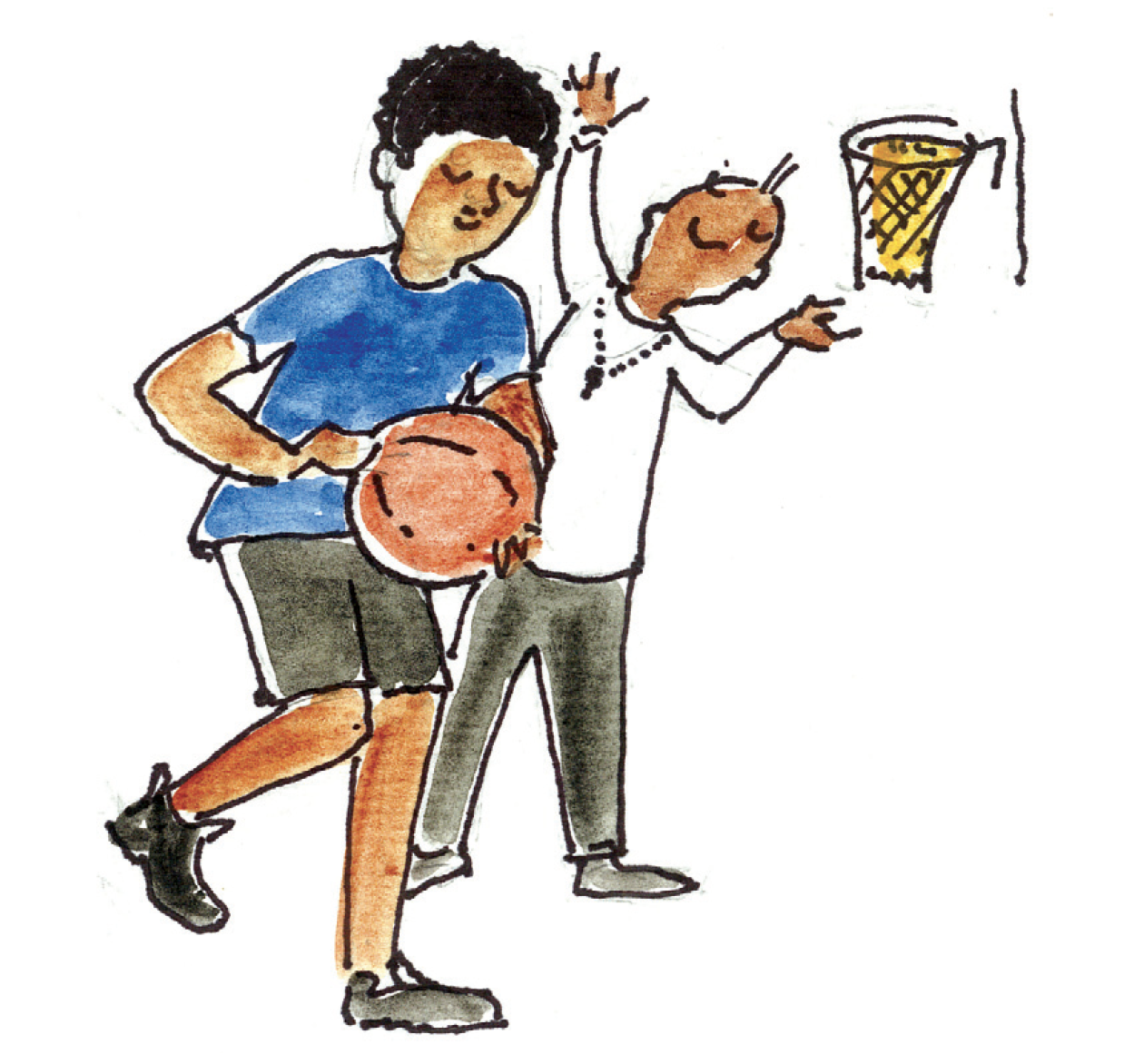
Get them involved in sports, music or art programs
Everyone needs help raising their children. It’s too hard a job to do alone. Parenting can be a wonderful experience, but there are times when you will need a break or some other kind of support. That’s where other people come in. Having other adults in your son’s life is good for him, too. It means someone else is there when he needs help. He will have other role models and people to teach right from wrong and how to live life. Having your child’s other parent and your family involved are especially important. There are many places you can find help and support. Some of them, like family, are automatic. You can find or create others. The most important places include your neighborhood, church or other religious organizations, daycare centers, school and teachers, scouting or other clubs, and, if you are lucky, maybe a mentor who will take an interest in your child. Look what other people involved in your daughter’s life can mean for her. It can make her realize the world is full of real people, it gives more people to keep an eye on her, it provides more to stimulate her mind, and there are other people to help out if you get in a jam or if your daughter does.
Other Adults: Creating Community
Involving other adults in your child’s life means you must create a community. This community will give your child other people to know and trust. It can give you a break when you need it and a different set of positive influences for your daughter.
How can you get other adults involved in your child’s life? There are lots of possibilities:
- Meet your neighbors and introduce your child to them. Your neighbors should know your child’s name and how to reach you if they see something you should know about. Find out who is around at different times and who your child can call on he has a problem. When your child is older, have him do things to help your neighbors, especially the seniors. It will reinforce his sense of being part of a community.
- Get to know your neighborhood store owners, bus drivers, mail carriers and school crossing guards. They all may see your child during the week. Ask their names. Introduce your daughter to them by name and explain to her what they do and why it’s important. She will begin to understand the world and the many good people in it.
- Join a church, synagogue or mosque that has programs for children. These programs will teach religious and other values you may want your child to have. For example, Adora Mora says that in addition to her parents, her church taught her values such as being honest and treating others the way she would want to be treated.
- Sign up your child with a good daycare center, and later, a preschool. Government programs include Early Head Start for children up to age 3 and Head Start, an early childhood education program for children age 3 to 5. There also are private daycares and preschools.
- Get your child involved in programs run by the YMCA/YWCA or the Boys & Girls Club of America. There are over 10,000 YMCA locations in the United States, for example, in all types of communities. They offer programs in early child care, education, sports and even summer camps, as well as providing mentors for kids. Boys and Girls Clubs exist in over 4,000 locations and offer programs in the arts, health and life skills and sports. These provide great opportunities for kids of any age.
- Introduce your child to the children’s librarian at your local library. See if there are reading or other clubs offered by nearby public libraries.
- Encourage your child to get involved in sports or an after-school class like art or music. Good coaches and teachers will take an interest in your child.
A Mentor: Showing the Way
A mentor is an adult who takes a healthy, personal interest in your child and models positive behaviors. Mentors can offer suggestions that can change a child’s life. The website www.education.com says “All children need an adult to help with homework, listen when they have a problem, and push them to be their best. If you're overwhelmed by the stresses of life and parenting or just think your child needs another caring adult to help foster successful habits, a formal relationship with an adult mentor might be the answer.”
You can encourage your son to seek out advice from teachers, librarians, coaches or other adults, but only after you have met the teacher yourself.
Some community programs, such as Big Brother Big Sister have mentor programs. These groups check out the adults who will be the mentors to be sure it will be a safe relationship for your child. Other times, if your son has a special interest in a hobby or some subject at school, an adult may take an interest in him and offer to work with him without being part of a formal program. In Adora Mora’s case, the head of the chess program at her local library thought she was an exceptional player and wanted to help her get better. It is important in these cases for you to meet the person and be sure the relationship seems ok. Mentors are generally attracted to kids who are interested in something the mentor does and wants to get ahead and is willing to work hard to get there. If you instill these qualities your child, he or she will have a much better chance of attracting the attention of someone who wants to help. Finding a mentor can change your child’’s life.
Earlier in this book you read about Adora Mora, who was taken to a fancy dinner by the head of the library chess club. The restaurant had sparkling glasses and white tablecloths, and Adora had never been to a restaurant that nice before. She said it opened her eyes to the possibility of living a life that took her to nice places. She also participated in a theater company for at-risk kids where she learned to dance and perform. Dancing taught her discipline and hard work. One of the women who founded that group took an interest in Adora and was the one who suggested she apply to universities such as Harvard and Stanford.
David Scott was lucky to have a social worker take a personal interest in him. The social worker took David out to lunches and wrote a letter to a family that asked David to come live with them. They lived in a neighborhood with a good high school, where nearly everyone went on to college. David naturally thought he should do the same, and that’s why he went to college.
David Tippiconic had an engineering professor in college who told him to take a job offer from Phillips Petroleum Company, a multi-billion dollar organization. “It’s a good company,” the professor said. “Work hard for them and you will be successful.” David later became one of the top executives in that company and then the president of a similar company.
Iliana Rodreguiz had a high school teacher who encouraged her to go to college. No one in her family had ever been to college, but Iliana got a scholarship and went on to graduate with a bachelor’s degree.
All of these stories show how important a mentor can be at the right time in your child’s life.
10. Teach them values and social skills
Care for other people
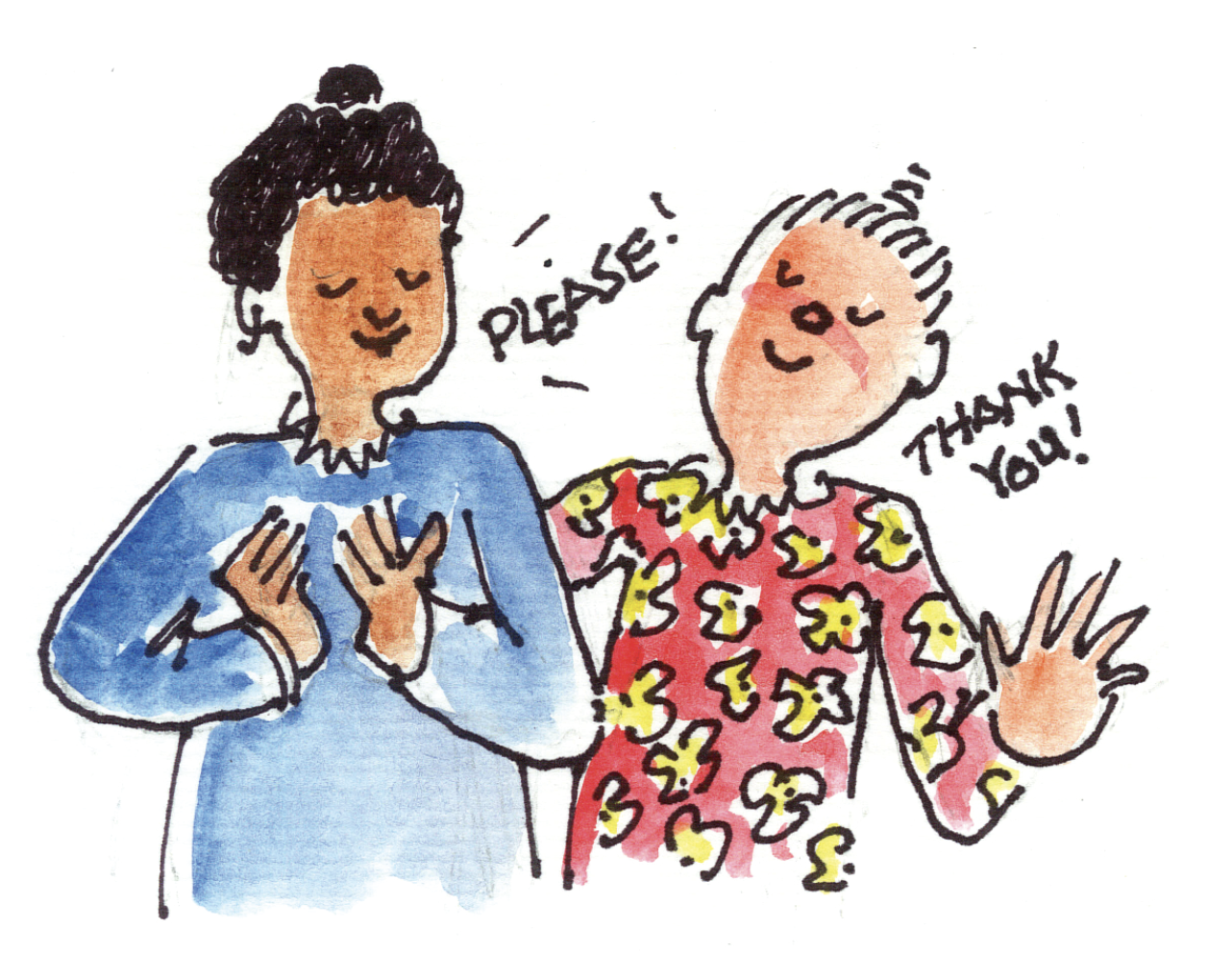
Use good manners - say please and thank you
Don’t yell, scream, hit or use bad words
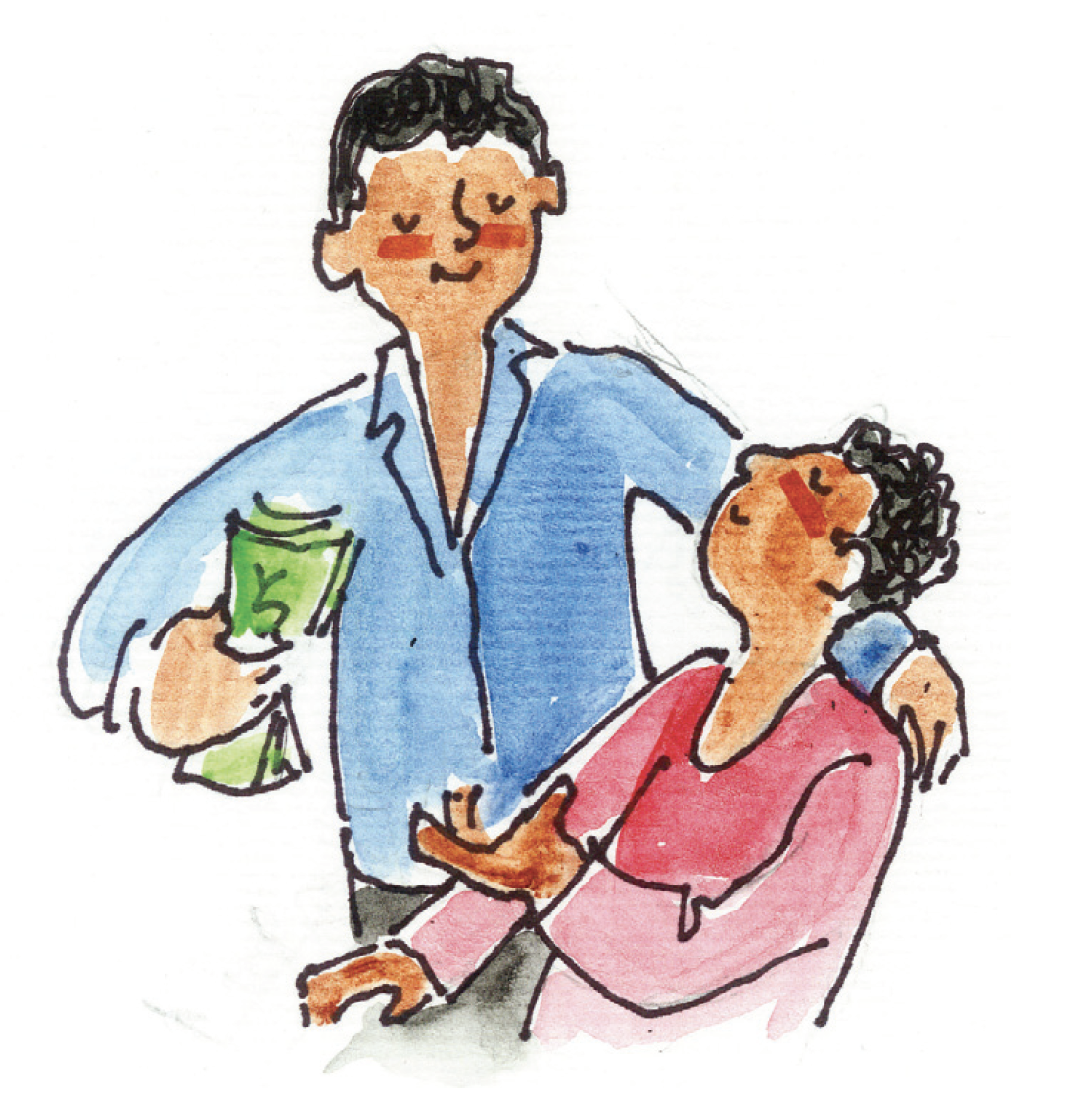
Be honest, kind and respect others
Children learn how to behave from watching and listening how parents and other adults and children behave. They see how we act, they hear how we talk, they learn what we eat, and they eventually pick up our attitudes toward life. Everything you do, everything you say, and every way you act in front of your child is being a model that they will follow. You have a chance to help them be great adults just by the way you act and model your performance every day. How Do Kids Learn? Kids learn by watching and listening. They learn how to talk this way, and they learn how to act this way. If you talk nicely, they will learn to talk nicely. And if you yell at people, they will think the right thing for them to do is yell at people. Every boy deserves a mom who doesn’t hit him because it does harm in the long run. It not only may make him afraid of her, but she doesn’t want him him to hit her or other kids. For the same reason, she doesn’t say her daughter is stupid because she doesn’t want her daughter to say other people are stupid. Every girl deserves a dad who doesn’t beat or abuse her because he doesn’t want her to abuse her own kids. And he doesn’t s swear or curse in front of his son, because he doesn’t want his son to swear or curse at other people.
There are three things you can to do to show your kids the behavior you want them to have:
- Show him not to yell and scream when things don’t go their way. You have to show him not to have temper tantrums and not to scream at people (by not screaming at him), to keep trying when things are tough, to work hard, to be curious about the world, to be nice to other people.
- Show her not to hit, by not hitting her when she does something wrong
- Show her to say “Please” and “Thank you” by saying please and thank you yourself.
- Show him that it is okay to fail and to try and bounce back by trying again until you get something to work by doing these things yourself.
- Try to not get too stressed. A stressful home life is incredibly hard on kids. It keeps their brain from developing properly and can make them fearful and shy. One expert says if you are calm, relaxed and don’t overreact to broken dishes and other such things, your children are likely to be calm and relaxed. If you’’re nervous and tense, your children are likely to be nervous and tense.
What Other Kind of Things Should You Model?
The book “”Simple Secrets Real Mom’s Know” by Michele Borba has some good ideas on being a role model for your son. Think about modeling these kinds of behavior :
- Show kindness and respect for others. Speak to your neighbors and store owners and bus drivers so your child will learn that they are people that she can get to know.
- Eat good foods and don’t plop yourself in front of television every night
- Stay healthy. Go to the doctor and exercise when you can. Take your child for walks with you as a form of exercise.
- Keep a positive attitude and show that you can get through tough situations.
- Don’t use bad language in front of your kids. If you say “Motherfucker”,” Bitch” or “Damn You,” that’s how your kids are going to learn to talk.
- Model a love for reading, by reading to your daughter every night and helping her learn what the words are and what the pictures show.
- Be honest with your kids and other people. If you make a mistake, say so. Kids need to know that it is okay to make a mistake and then get up and keep going.
- Don’t hit or yell, but explain to your son why he shouldn’t do something. Then take the problems away, or remove him, or find something else for him to do.
